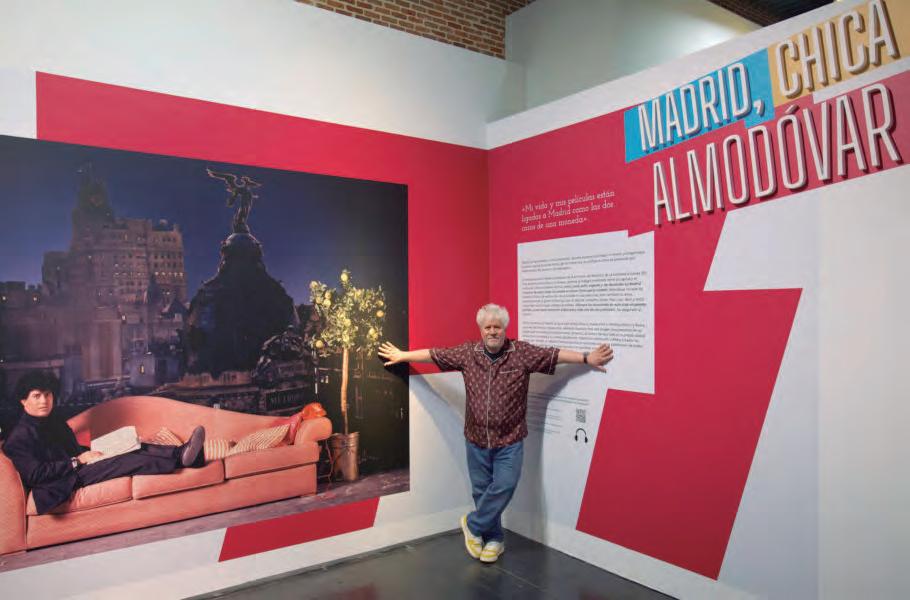
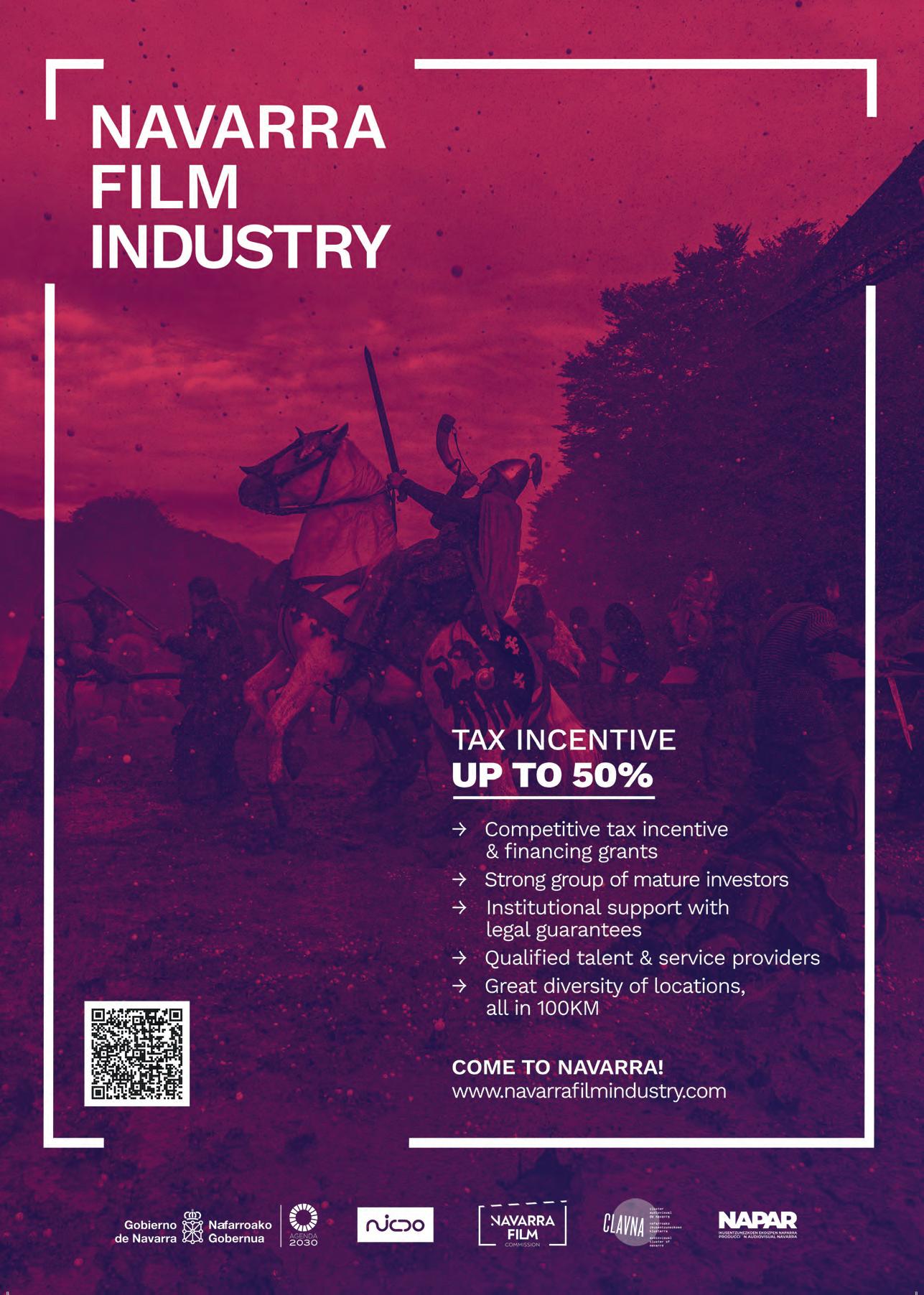





Although the Berlin Film Festival is not the first of the year, it does mark the first major gathering of the global film industry.
People in the business were anxious to see if there were gonna be major changes for the 75th edition. Tricia Tuttle, coming from London Film Festival, had been named director of the Berlin Film Festival, taking over from Executive Director Mariette Rissenbeek and Artistic Director Carlo Chatrian. She’s been in charge of the festival from 1 April 2024.
It´s still early to say, considering we are yet to see the films after they’ve been screened. But apparently, there has been no significant change in direction for the festival, if we base ourselves on a detailed analysis of the titles programming.
The most remarkable change would be the introduction of a new section, Perspectives, which replaces the somewhat vague Encounters. This new section for debut films is an interesting improvement, allowing for a stronger focus on emerging filmmakers.
In any case, there will be anticipation to see the festival’s development itself and, above all, it might be necessary to give it another year to see if there is any shift.
RUBIK magazine is facing its second year and we are happy to distribute our Berlinale international issue once again in the European Film Market.
This February issue is therefore mainly dedicated to this festival and its European
Film Market. First of all, we publish an overview of the films that will compete for the Golden Bear. As a Spanish magazine, we feel obligated to focus on Spanish cinema, but also on Portuguese and Latin American cinema. The latter, in particular, has a significant presence in this Berlinale edition, so we recommend taking a look at the titles selected this time.
In relation to this idea of discussing cinemas from non-hegemonic regions, our interview with Vincenzo Bugno, director of the World Cinema Fund, makes special sense. This is a key entity for the film development of emerging and developing countries, and through this conversation, he provides us with insights into the challenges and situation these countries face.
Another area of great interest in this edition is everything related to Spain being the Country in Focus at the European Film Market. The country has prepared a wide range of industry activities to connect Spanish companies and professionals with the rest of the sector internationally.
Besides publishing a schedule with the market screenings from the Spanish sales companies, we would like to highlight one of the articles in this section: the Spanish Producers Spotlight.We have reached out to the 10 selected producers to get a clear overview of the type of cinema they create, the projects they are working on, and what they are looking for here in the market.
Our interview with Juan Manuel Guimeráns, the new president of the Spain Film Commission, is also noteworthy. This
association has been, and continues to be, essential for the management and promotion of film shoots in Spain.
Returning to the Latin American theme, in this edition, we feature a report written by the so-called Colectivo de Cineastas, an association of creators in Argentina who highlight the difficult situation for the cultural sector there, especially following the rise to power of Javier Milei’s government.
Additionally, we include a text in which we address the duality regarding a film like Emilia Pérez, a French film about a Latin American topic. The huge success during the awards season is clashing with harsh criticism from many people in Mexico and other parts of Latin America. We try to summarize the situation to see how this controversy is unfolding.
In the last pages, we pay tribute to David Lynch following his recent passing.
The director, one of the most important artists of the past 50 years, leaves an essential legacy in cinema, and here we publish an analysis of what ‘Lynchian’ means. Additionally, we feature another article reviewing various titles and creators who have contributed to the surrealist movement in the history of film.
We hope you enjoy our new international edition and wish you a great start to 2025. May the Berlinale market be fruitful for you!

NAVIGATING
FRONT COVER: MARION COTILLARD IN THE ICE TOWER, FILM DIRECTED BY LUCILE HADŽIHALILOVIC © 3B-Davis-Sutor Kolonko-Arte
EDITED IN MADRID IN FEBRUARY 2025 BY MARATÓN AUDIOVISUAL S.L. ALL RIGHTS RESERVED
LEGAL DEPOSIT: M-1895-2024
ISSN: ISSN 3020-5107
GENERAL CONTACT: HOLA@RUBIK-AUDIOVISUAL.COM
EDITORIAL CONTACT: REDACCION@RUBIK-AUDIOVISUAL.COM
ADVERTISING CONTACT: MARKETING@RUBIK-AUDIOVISUAL.COM

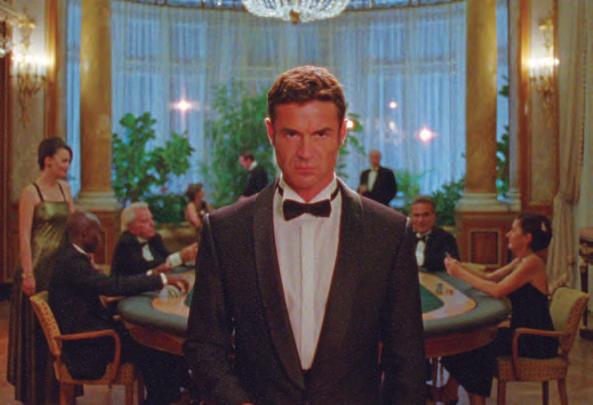






lnvestments in foreign cinematographic and audiovisual productions in Spain entitle the producer to a tax deduction of 30% of the first million euros of the deduction base and25% if it exceeds that amount, with a maximum of 10 miIlion euros per production. The Region of Valencia has a subsidy of25% ofthe costs incurred during the production of the audiovisual work throughout its territory. The maximum amount of aid is 7.5 million and it is compatible with other public aid taking into account the maximum intensities of 50% or 60% in the case ofcoproductions.
• The aquatic areas ofCiudad dela Luz are differentiating elements of thecomplexcomparedto other filming centers in the world.
• The renowned filmmaker Alejandro Amenábar has filmed his latest film, 'Elcautivo' on thesets ofCiudaddela Luz.
• Ciudad dela Luz iscommittedto promoting a moresustainable and efficientfilmindustry.


THE 75TH EDITION OF THE BERLIN FILM FESTIVAL IS HELD FROM FEBRUARY 13 TO 23, 2025. THIS IS THE FIRST EDITION DIRECTED BY TRICIA TUTTLE TAKING OVER THE BATON FROM CARLO CHATRIAN AND MARIETTE RISSENBEEK. THERE ARE NO SIGNS OF A NOTICEABLE CHANGE OF THE COURSE FOLLOWED IN THE PAST YEARS. ACTUALLY, NINE OF THE DIRECTORS IN THE COMPETITION HAVE ALREADY SEEN THEIR FILMS SCREENED IN PREVIOUS EDITIONS. AMERICAN FILMMAKER TODD HAYNES IS PRESIDENT OF THE COMPETITION’S JURY THAT WILL DECIDE THIS YEAR’S GOLDEN BEAR. LET´S TAKE A LOOK AT THE 19 CONTENDERS.

Mexican helmer Michel Franco continues with his journey through the big festivals. Early in his career he was a protégé of the Cannes Festival (with titles such as After Lucía or Chronic ) and in recent times his films has been shown in Venice, being the highlight the Grand Jury Prize for New Order Now it’s Berlin’s turn, with a film about immigration starring Jessica Chastain and Isaac Hernández. The Match Factory is the sales agency.
Storyline: Believing his lover will support him, a young Mexican ballet dancer crosses the border to pursue his dreams in San Francisco. But as ambition and love clash with harsh realities, he must face the true nature of their relationship.

by Richard Linklater. Richard Linklater’s relationship with the Berlinale is strong, as he has twice won the Silver Bear for Best Director (for Before Sunrise and Boyhood ), so it is not surprising that he is premiering his new film here, in which he works again with his favorite actor, Ethan Hawke. He is joined in the cast by Margaret Qualley, Bobby Cannavale and Andrew Scott. Sales are handled by Sony Pictures Classics and the script is written by Robert Kaplow, whose novel Me and Orson Welles was adapted by Linklater.
Storyline: On the evening of March 31, 1943, legendary lyricist Lorenz Hart confronts his shattered self-confidence in Sardi’s bar as his former collaborator Richard Rodgers celebrates the opening night of his groundbreaking hit musical “Oklahoma!”.

by Lionel Baier. The Swiss director Lionel Baier has participated in festivals such as Cannes or Locarno, with films like La vanité or Continental Drift (Sur) , but this is the first time he is atternding Berlinale. mk2 is in charge of the sales of this comedy-drama about a boy who grows up in a family of artists during May ‘68.
Storyline: An eccentric family portrait set during the May 1968 protests in Paris. A nine-year-old boy stays with his grandparents and uncles while his parents protest. When an illustrious guest seeks refuge in the apartment, the family’s dynamics change.
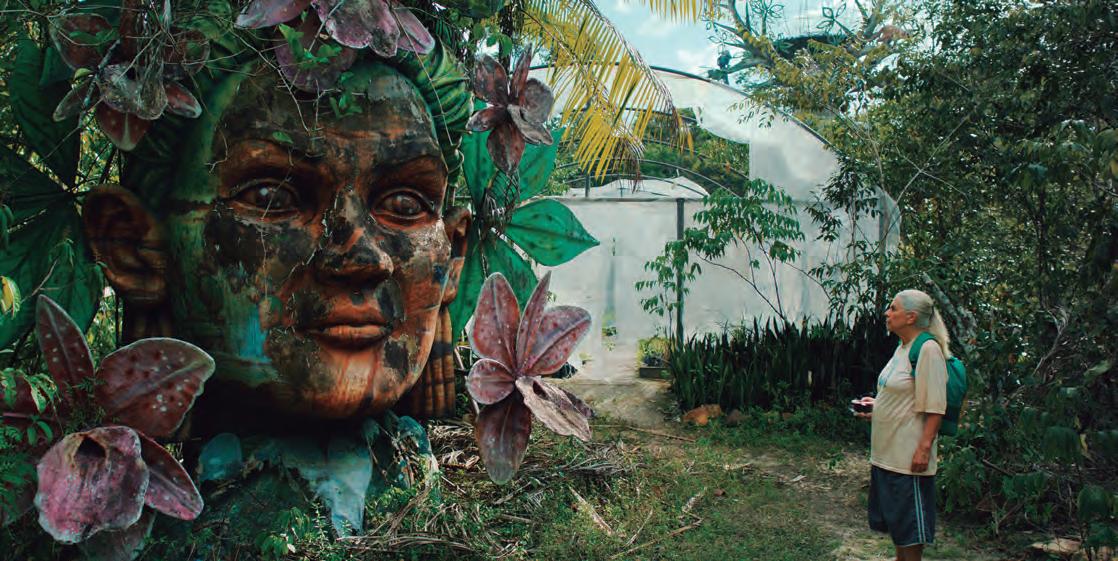
Gabriel Mascaro. Brazilian Gabriel Mascaro is one of the three Latin American filmmakers in competition, along with Argentine Iván Fund and Mexican Michel Franco. Mascaro was already in Berlin with Divine Love, which was selected in Panorama. The change of getting the Golden Bear reflects the strength of Brazilian cinema, which has emerged after dark years. Denise Weinberg and Rodrigo Santoro lead the cast of this dystopian story with a political touch whose sales are handled by Lucky Number.
Storyline: To maximise economic productivity, the government orders the elderly to relocate to distant housing colonies. Tereza, 77, refuses – and instead embarks on a journey through the Amazon that will change her destiny forever.

Milk by Rebecca Lenkiewicz . Renowed playwright Rebecca Lenkiewicz debuts as a director with this film, which is the UK representative this year at the Competition. She has worked a lot for cinema but as a screenwriter in films like Ida, Disobedience, She Said or Colette. Emma Mackey, Fiona Shaw, Vicky Krieps and Vincent Perez lead the cast of the film based on the novel of the same name by Deborah Levy. Hanway Films is in charge of world sales.
Storyline: Rose and her daughter Sofia journey to a Spanish seaside town to meet an enigmatic healer. As Sofia embraces an affair with an alluring stranger, tensions with her overbearing mother threaten their fragile bond.

Jude. One of the most relevant auteurs in the selection of this edition at Berlinale is the Romanian Radu Jude, who often chooses this festival to premiere his works. He won the Golden Bear with Bad Luck Banging Or Looney Porn but had already achieved Best Director recognition for Aferim!. This comedy drama is inspired by Rossellini’s Europe ‘51, according to the director. Luxbox handles international sales.
Storyline: Orsolya is a bailiff in Cluj, the main city in Transylvania. One day she has to evict a homeless man from a cellar, an action with tragic consequences that triggers a moral crisis which Orsolya must weather as best she can.


Lucile Hadžihalilovic.
The French filmmaker of Bosnian parents Lucile Hadžihalilovic, who has collaborated on some of the works of her husband, Gaspar Noé, is still unknown to much of the international cinephiles, despite notable productions -—always with sumptuous visuals— such as Evolution or Earwig that were selected at the San Sebastián Festival. Marion Cotillard stars in her new film, a drama with fantasy overtones whose sales are managed by Goodfellas.
Storyline: Colder than ice, her kiss pierces the heart ... The 1970s. Jeanne, a young runaway, falls under the spell of Cristina, the enigmatic star of The Snow Queen, a film which is being shot in the studio where Jeanne has taken refuge.

GIRLS ON WIRE by Vivian Qu . China has two films this year as candidates for the Golden Bear. One of them is directed by Vivian Qu, who oddly enough already won the Golden Bear, although as a producer, for Black Coal, Thin Ice. Her third feature film as a director, sold by Films Boutique, follows two Chinese women on the run from the local mafia.
Storyline: Tian Tian, the single mother of a five-year-old daughter, kills a drug dealer and is then pursued for vengeance. The only person she can turn to for help is her female cousin, Fang Di, whom she hasn’t seen in five years and is reluctant to reconcile.
KICK YOU by Mary Bronstein. In addition to Richard Linklater’s film, US cinema has another title in competition. It is a film under the A24 label directed by Mary Bronstein, who presents her second feature film. The first one was released 17 years ago, Yeast, a mumblecore film that premiered at SXSW. This ‘descent into the hell of motherhood’, as it was defined at Sundance, has been praised for Rose Byrne’s performance. The cast includes A$AP Rocky, Conan O’Brien, Danielle Macdonald and Ivy Wolk.
Storyline: With her life crashing down around her, Linda attempts to navigate her child’s mysterious illness, her absent husband, a missing person and an increasingly hostile relationship with her therapist.


DRØMMER by Dag Johan Haugerud. Norwegian director Dag Johan Haugerud was last year with Sex in the Panorama section of Berlinale, although he was already familiar with big festivals with titles like Love and Beware of Children, which were screened in Venice. This film closes his ‘Sex Dreams Love’ trilogy, which is an exploration of the challenges to social norms regarding topics such as sexuality, relationships, intimacy or queerness.
Storyline: Johanne’s intimate writings about her crush on her teacher ignite both tension and self-reflection within her family, as her mother and grandmother confront their own unfulfilled dreams and desires.

Hélène Cattet and Bruno Forzani.
Thriller and horror lovers are well aware of Hélène Cattet and Bruno Forzani, filmmakers who bring their fourth feature film to Berlinale, after stunning films such as their radical homages to giallo Amer and The Strange Color of Your Body’s Tears. The French couple based in Brussels will give a touch of diversity, because genre cinema always has little presence in Berlin. Buyers should contact True Colors to acquire film’s rights.
Storyline: When the mysterious woman in the room next door disappears, a debonair 70-year-old ex-spy living in a luxury hotel on the Côte d’Azur is confronted by the demons and darlings of a lurid past in which moviemaking, memories and madness collide.

parents who lives in Germany. His debut film, Al Garib ( The Stranger ), which was related to the story of his family in the occupied Golan Heights, participated in the Giornate degli Autori (Venice) and now shows his second feature film, with which is a new chapter of his trilogy ‘Homeland’. It is the only Arab film in competition and sales are handled by Intramovies.
Storyline: On a remote island, Munir seeks solitude to contemplate a final act, only to find unexpected solace in the quiet presence of Valeska (Hanna Schygulla), whose compassion reignites his fading will to live.
Cinema from Argentina is going through difficult times due to the rise to power of Javier Milei. Their cultural industries are suffering and the selection of Iván Fund’s new feature film in competition is, without a doubt, a gesture of support. The filmmaker premiered his previous feature film, Dusk Stone, at the Giornate degli Autori (Venice), and now presents a black and white road movie through the Argentine countryside. Sales are handled by Luxbox.
Storyline: In the Argentinian countryside, a child’s special gift gives her opportunistic guardians the idea of offering consultations with an animal medium in order to earn a living.
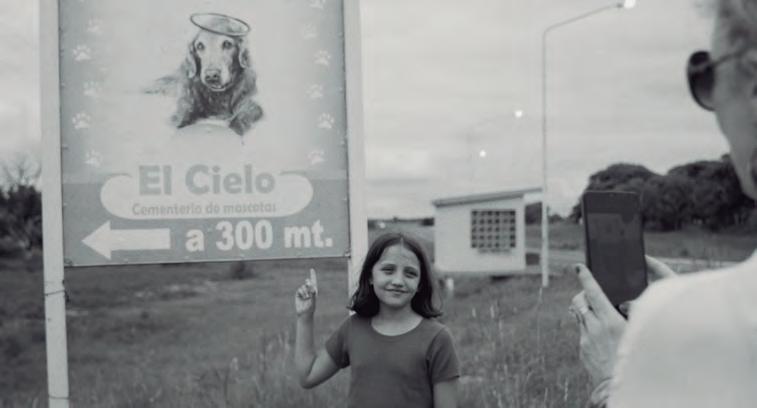


DOES THAT NATURE SAY TO YOU by Hong Sangsoo. Prolific South Korean filmmaker Hong Sangsoo has taken his films to different festivals but Berlinale is one of his favorites; In fact, it is the sixth consecutive selection by the German festival. He has never won the Golden Bear but he has won multiple awards: Grand Jury Prize with The Novelist’s Film and A Traveler’s Needs; Best Direction with The Woman Who Ran; Best Screenplay with Introduction and Best Actress with On the Beach at Night Alone.
Storyline: A young poet drops his girlfriend off at her parents’ house and is amazed by its size. He bumps into her father, meets her mother and sister, and they all end up spending a long day together; fuelled by conversation, food and libations.

by Johanna Moder. In dialogue with another film in the Competition such as If I Had Legs I’d Kick You —and with quite a few films in contemporary cinema—, the Austrian filmmaker Johanna Moder brings a film about the ‘shadows’ of motherhood. After High Performance and Once Were Rebels , her third feature film is a psychological thriller whose sales are managed by The Match Factory.
Storyline: 40-year-old Julia, a successful conductor, and her partner Georg are longing for a child. The birth does not go as planned and the baby is immediately taken away, leaving Julia in the dark about what has happened. When finally reunited with the child, Julia feels strangely distant. She begins to doubt whether it is really her child.
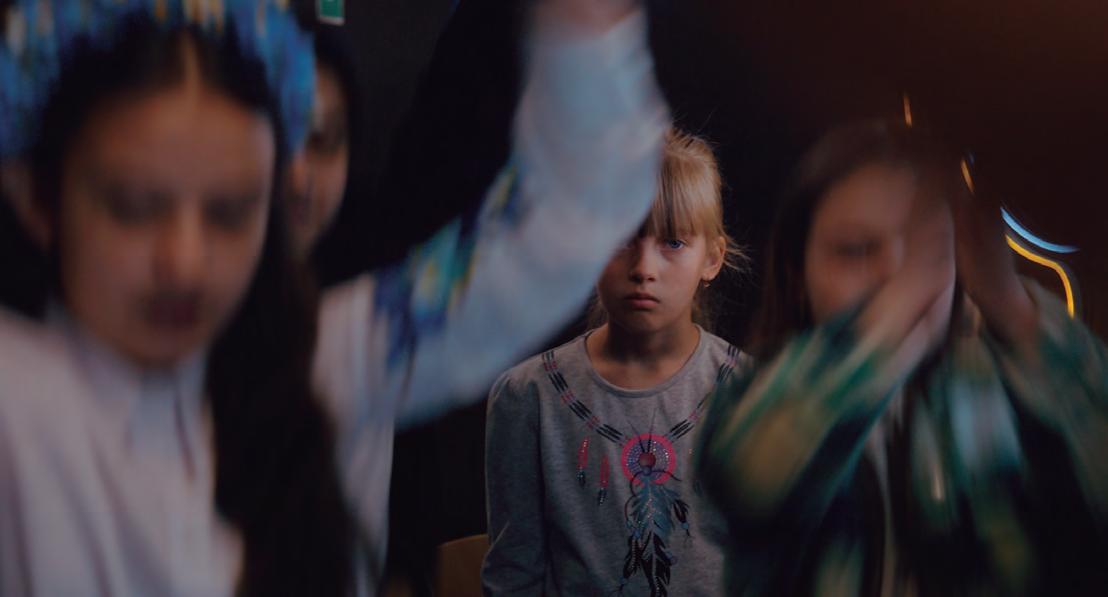
by Kateryna Gornostai. Although documentary films do not usually find a place in the official selections of major festivals, in recent years they have garnered a lot of recognition, such as last year’s Golden Bear for Dahomey. In 2025, the only documentary that can achieve this award is Timestamp by Kateryna Gornostai, the first Ukrainian film in competition in 25 years.
Storyline: Despite the war, school life continues in Ukraine, with pupils and teachers striving to carry on learning even under constant threat. The film is a mosaic of the everyday lives of teachers and students from different corners of Ukraine.

by Frédéric Hambalek. Young German director Frédéric Hambalek is one of the surprising picks in the competition, although we have to keep in mind that there’s always a local film quota. This is the filmmaker’s second feature film, after Modell Olimpia, which had its premiere in Tallinn Black Nights. This drama follows the same subjects, exploring the dark side of family dynamics.
Storyline: Julia and Tobias discover that their daughter Marielle has suddenly developed telepathic abilities and can see and hear everything they do. This leads to situations ranging from the awkward to the absurd as uncomfortable truths are revealed.

LIVING THE LAND by Huo Meng. A few years ago, Crossing the Border - Zhaoguan was one of the best recent debuts in Chinese cinema, which is always renewed with emerging talent. Huo Meng’s second feature film is also the second Chinese film in competition. M-Appeal is handling international sales for this family drama that follows the lives of four generations over the course of a year.
Storyline: With both parents working far away, ten-year-old Chuang is being raised by extended family in his home village, where thousands of years of rural tradition collide with the socio-economic changes of China in the early 1990s.

ARI by Léonor Serraille. Léonor Serraille is a French filmmaker whose debut film, Jeune femme (2017), won the Golden Camera. With her second work, Un petit frère, she was selected in Competition for the Palm d’Or. Now she aims for Berlinale with Ari, a film that revolves around a young teacher who collapses in the middle of a school inspector’s visit. Its sales are managed by Be For Films
Storyline: Ari, a young teacher, quits his job and is thrown out of the house by his father. Lost and alone, he reconnects with old friends, triggering a journey of self-discovery.
FILM
INNOVATIVE PRODUCTIONS. RUBIK HAS INTERVIEWED ITS DIRECTOR, VINCENZO BUGNO, TO HAVE A BETTER UNDERSTANDING ON HOW THEY PROMOTE HIGH-QUALITY FILMMAKING IN REGIONS WITH A WEAK INFRASTRUCTURE FOR FILM.


Founded in 2004, WCF concentrates on backing the production and distribution of films from Latin America, the Caribbean and the Pacific region, Africa, the Middle East, Central and Southeast Asia, the Caucasus, as well as Bangladesh, Nepal, Mongolia and Sri Lanka.
Rubik: World Cinema Fund recently celebrated its 20th anniversary. What can you highlight of what’s been achieved and what’s been the evolution like during all these years?
Vincenzo Bugno: The WCF was created more than twenty years ago with the aim of contributing to the democratisation of the film industry at an international level, trying to make visible a cinema, or rather film cultures that are often invisible. Or, indeed, trying to contribute to their existence.
We are certainly happy with the results of our work.

All the projects funded by the WCF, apart from those still in production, have been realised, and the vast majority have been presented in the context of major international festivals.
And this has happened while remaining true to the identity of the WCF, which has always wanted to support ambitious films, innovative both in terms of content and from an artistic point of view.
Rubik: Would you say there are certain criteria behind supporting a project?
V. B.: It is an intense path... sometimes even painful... because we certainly cannot finance all the projects that fascinate us. The quality of the projects we receive is on average very high. And choosing from around 450 projects per year is certainly not an easy task.
The artistic profile of a project is certainly a key criterion. As well as its importance in the political and cultural context from where it originates.
“My impression is that often, beyond the difficulties, projects from the WCF regions are more willing to take risks. They are more open, curious. Also from an artistic point of view, of narrative structures”
Rubik: What are the main challenges right now for WCF regions?
V. B.: The situation is complex both in the so-called regions but also in Europe. The political situation is complex, the financing of cultural initiatives also. We are living in a time that we would never have imagined a few years ago. More conflicts, more wars. We strongly believe in cultural exchange, in international cooperation. Things that seemed to be
“AT THE BEGINNING, MOST PROJECTS CAME TO WCF FROM LATIN AMERICA. NOW IT HAS BECOME VERY DIVERSIFIED”
taken for granted and that no longer seem to be. We are fortunate to be able to count on partners who strongly believe in our work.
It is difficult to speak in general about the situation in the different regions of the WCF, which are extremely diverse, culturally, economically, politically. I believe that we will be increasingly committed, however, not only to the realisation of the funded projects but also to their visibility, contextualised in the different regions, to their relationship with the public.
Rubik: Have you seen some countries succesfully evolve during these years from emerging to strong cinema condition?
V. B.: At the beginning of our activity, most projects came to us from Latin America. Over the years, while the Latin American presence has remained constant, the panorama of projects submitted has become very diversified. And thanks also to specific funding programmes, we have

been able to finance quite a few projects from sub-Saharan Africa. Not forgetting South-East Asia
Rubik: Some production companies in European countries may be skeptical in partnering with these regions with a weak infrastructure. Why do you think it can be mutually beneficial and what can you say to appease their concerns?
“Before submitting a project, however, we recommend that you get in touch with us, in order to fundamentally understand the best time for the actual presentation”.
V.B.: I would not speak of scepticism. Thanks to the WCF, for example in Germany, many production companies have had the opportunity to develop cooperative relationships, co-productions with WCF regions. I think this is a huge cultural and structural enrichment for both sides.
Rubik: When it comes to the projects presented by these regions, what are their main mistakes in terms of documents presentations or pitches?
V. B.: I would not speak of mistakes, we do not claim to teach anyone anything. Before submitting a project, however, we

recommend that you get in touch with us, in order to fundamentally understand the best time for the actual presentation.
We always recommend taking great care in the description of the artistic identity of a project. And in the credibility of the financial presentation, budget, financing plan.
Rubik: What would you highlight of what cinemas from these countries are bringing to the global scenario? What subjects wouldn´t be tackled otherwise?
V. B.: We must stop looking at one side of our cinema, that of countries with a somewhat solid film industry, and that of others. Democratising, decolonising also means this.
My impression is that often, beyond the difficulties, projects from the WCF regions are more willing to take risks. They are more open, curious. Also from an artistic point of view, of narrative structures. A perhaps risky statement on my part. But I often have this impression.
Rubik: Regarding Berlinale, what will be the WCF activities during the 2025 edition?
V. B.: First of all, there will be five films supported by the WCF in the different sections of the Berlinale. They come from Argentina, Egypt. And from Lesotho, Sudan, Rwanda.
And then the WCF DAY, which is a bit of a workshop of WCF thinking. As well as all the synergies developed together with BERLINALE PRO colleagues (EFM, Talents, Co-production Market, WCF).


SPAIN IS IN THE SPOTLIGHT AT THIS 75TH EDITION OF THE BERLINALE AS THE COUNTRY IN FOCUS AT THE EUROPEAN FILM MARKET. WHILE SPANISH CINEMA HAS HAD SIGNIFICANT SUCCESS HERE IN THE PAST, ON THIS OCCASION, THE FESTIVAL COMMITTEES DECIDED THAT IT WAS NOT NECESSARY TO SELECT MORE THAN A HANDFUL OF TITLES. NEVERTHELESS, WE OUTLINE ALL THE FILMS, SERIES, PROJECTS, AND CO-PRODUCTIONS WITH A SPANISH CONNECTION THAT ARE PART OF THE 2025 PROGRAM.
CARLOS AGUILAR SAMBRICIO
The most relevant Spanish selection of this Berlinale edition is Deaf, Eva Libertad’s debut feature film, which will be shown at Panorama. Sold by Latido Films, the film is produced by Distinto Films, Nexus CreaFilms and A Contracorriente, which is
also the Spanish distributor. This is the first Spanish feature film that has a deaf woman as the leading actress.
The filmmaker adapts a very successful short of the same name into a feature film. It tells the story of Ángela, a deaf woman, is expecting a child with her hearing partner, Héctor. The baby’s arrival causes a crisis in
their relationship, forcing Ángela to face the challenges of raising her daughter in a world which is not made for her.
“The experience of writing and directing the short film was intense and eyeopening. As a screenwriter, it was my first encounter with the themes of motherhood and deafness, which left me with the feeling

that there was still so much more to tell in Ángela’s story. I also realized the impact this story has on hearing audiences, who are deeply moved by the discovery of a reality they had never considered before”, remarks Eva Libertad.
As happens too often, Spain does not have any films in Competition. But there is a film with a Spanish co-production from the company Amore Cine, which has among its founders Paz Lázaro, a former high-level representative at Berlinale. The film is The Message, directed by the Argentine Iván Fund, and produced mainly by the Argentine Rita Cine and Insomnio Films.
Sold by Luxbox, the story is set on the dusty roads of the Argentinian countryside. A young girl’s gift pushes her opportunistic guardians to sell pet medium consultations to make a living. Whether magic or fraud, one thing is certain: the service is real – and innocence is a treasure.
Young Spanish filmmaker Lucía G. Romero is already experienced when it comes to Berlinale. Last year, with short

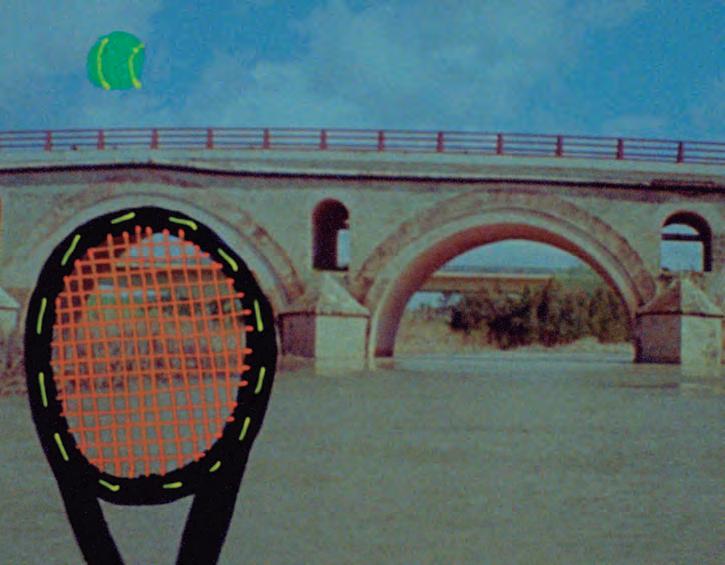
film Cura Sana, premiered at Geneartion 14plus, she won the Crystal Bear for the Best Short Film. This time she’s been selected in Berlinale Shorts with Close to September, produced by ESCAC Films.
What´s the storyline? Alejandra lives on a campsite close to the big hotels. She takes care of her siblings, hangs out in the neighbourhood and flirts casually with the tourists – until she meets Amara. A romance develops that grows more serious than Alejandra would like.
Another Spanish short film in Berlinale 2025 is Portals, a film by Elena Duque whose premiere is in Forum Expanded . It follows the course of the Guadalete river in Cádiz (south of Spain): a catalogue of landscapes that hide other landscapes. A collection of inter-dimensional portals (and
postcards). This experimental film mixes live action and animation, creating an impossible fauna and flora.
Distributed by Marvin & Wayne, the short film is produced by Rocío Mesa, director of Tobacco Barns. “Being part of this project has been a journey of joy and learning, as long and diverse as the riverbed depicted in the film. Now, at last, we reach the sea (…) Elena Duque is the great talent behind this magical piece, not only as the director but also as the director of photography and animator.”, says Mesa.
Since there are no many Spanish selections we have to focus on more coproductions. One of them is The Good Sister in Panorama. It´s a German film, sold by New Europe Film Sales, with Nephilim Producciones as Spanish participant. This
film won two industry awards at the 2024 San Sebastián Film Festival WIP Europa. This debut feature from emerging filmmaker Sarah Miro Fischer revolves around Rose, who is very close to her older brother Sam. When a woman accuses him of rape, Rose is asked to testify in the investigation against him. This tests both their relationship and her moral integrity.
Another co-production is Punku, peruvian film directed by Juan Daniel Fernández Molero that will premiere at Forum. Produced by Tiempo Libre (Perú) and Jur Jur Productions (Spain), a disturbing look at Peru’s cultural contradictions shot on a coarse mix of analogue and digital formats. The storyline is focused on Iván, who is found unconscious with an injured eye in the jungle. As Meshia reunites him with his family, she is drawn into a foreboding journey.
Spain has an impressive track record in Generation, with films like Summer 1993, Schoolgirls or 20,000 Species of Bees. This year, at Generation Kplus, there’s a documentary called Only on Earth, produced by Polar Star Films (Spain) and Hansen & Pedersen (Denmark). Sales are handled by Autlook Filmsales.
Directed by Robin Petré, the film unfolds over the course of a summer marked by extreme heat and drought, where inextinguishable wildfires rage for days,
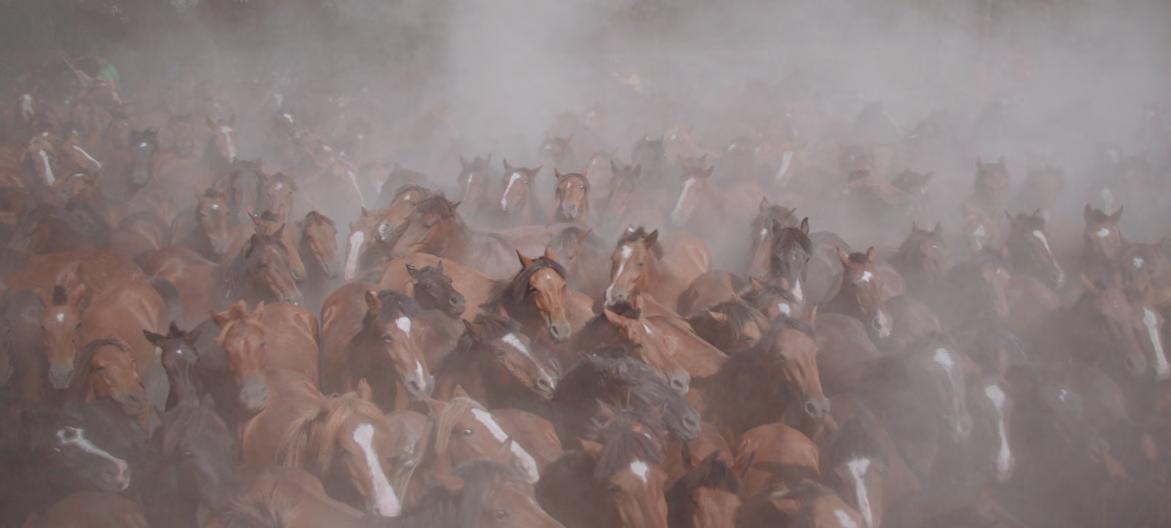


putting the local community and animals in real danger. The film shows the humble, sometimes heroic struggle of 4 characters: a child cowboy, a horse vet, a professional firefighter and a female shepherdess, to protect their livelihoods and homes, and to keep their traditions and dreams alive.
Also in Generation Kplus, Spain has a short film, Juanita, produced by Aguacate & Calabaza Films and directed by Karen Joaquín and Uliane Tatit. What´s the story? Twelve-year-old Latina Juanita is growing up with stringent female beauty ideals, even though she has now moved to the seemingly more open-minded Barcelona. Before a pool party, she realises something else has been growing with her: the hair on her legs.
The new section Perspectives, dedicated de first feature films, has a film from India that has a Spanish co-production: Shadowbox (Baksho Bondi). Directed by Tanushree Das and Saumyananda Sahi, the story follows Maya, who discovers that her husband – an ex-soldier who is suffering from PTSD – is the prime suspect in a murder investigation. She and her teenage son are forced to go to extremes to keep the family together. The Spanish company is Nomad Media & Entertainment, based in Majorca, whose founders are Prashant Nair and Itziar Fernández.
Dressed in Blue is a pioneering documentary about the LGBTQIA+ community that Antonio Giménez-Rico directed in the 1980s. It will participate in Berlinale Classics, in a version restored by Enrique Cerezo PC and Video Mercury Films. It portrays six trans women and their lives in 1980s Madrid. They speak frankly about their experiences as performers and prostitutes, facing marginalisation and the repressive laws that endured even after the end of the Franco era.
The Series Market Selects Label showcases series with substantial market potential, offering enhanced visibility and support for connecting with buyers, distributors, and reaching international audiences. Spain may not have much relevance at the festival with its films, but when it comes to TV series, that’s a different story.
Public broadcaster RTVE sells and coproduces, along with Mediacrest, the TV series Internal Affairs, whose showrunners are Alberto Macías and Winnie Baert. Created by Pedro García and Rodrigo Martín, and with directors such as María Togores and Samantha López Speranza, the story revolves around Clara, one of the first female police officers in Spain. She starts her first post in a dangerous Madrid neighborhood. She uncovers a heroin trafficking network and, with the help of two women affected by the drug issue, risks her life to expose it.
Atresmedia has two TV shows at the market. One of them is the dystopian thriller
Sanctuary, produced in collaboration with Pokeepsie Films, the company co-founded by Alex de la Iglesia. Directed by Zoe Berriatúa and Rodrigo Ruiz Gallardón, it is set in a post-climate disaster future, where women spend their pregnancies in the Sanctuary, a dome protecting them from pollution. Pilar’s arrival uncovers the dark truth behind the peaceful, isolated facility and the secrets it’s been hiding.
The other one is Your Honor, the Spanish remake of the Israeli series Kvodo. Produced in collaboration with Portocabo, and directed by Chiqui Carabante and Luis Prieto, the story follows judge Daniel Romero’s son Alex, who accidentally kills a motorist, then panics and flees the scene. When the victim turns out to be the son of a dangerous gangster, Romero decides to cover up the crime, risking everything to protect his son.
Spain does have a prominent presente at the 22th edition of the Berlinale CoProduction Market (February 15 to 19)

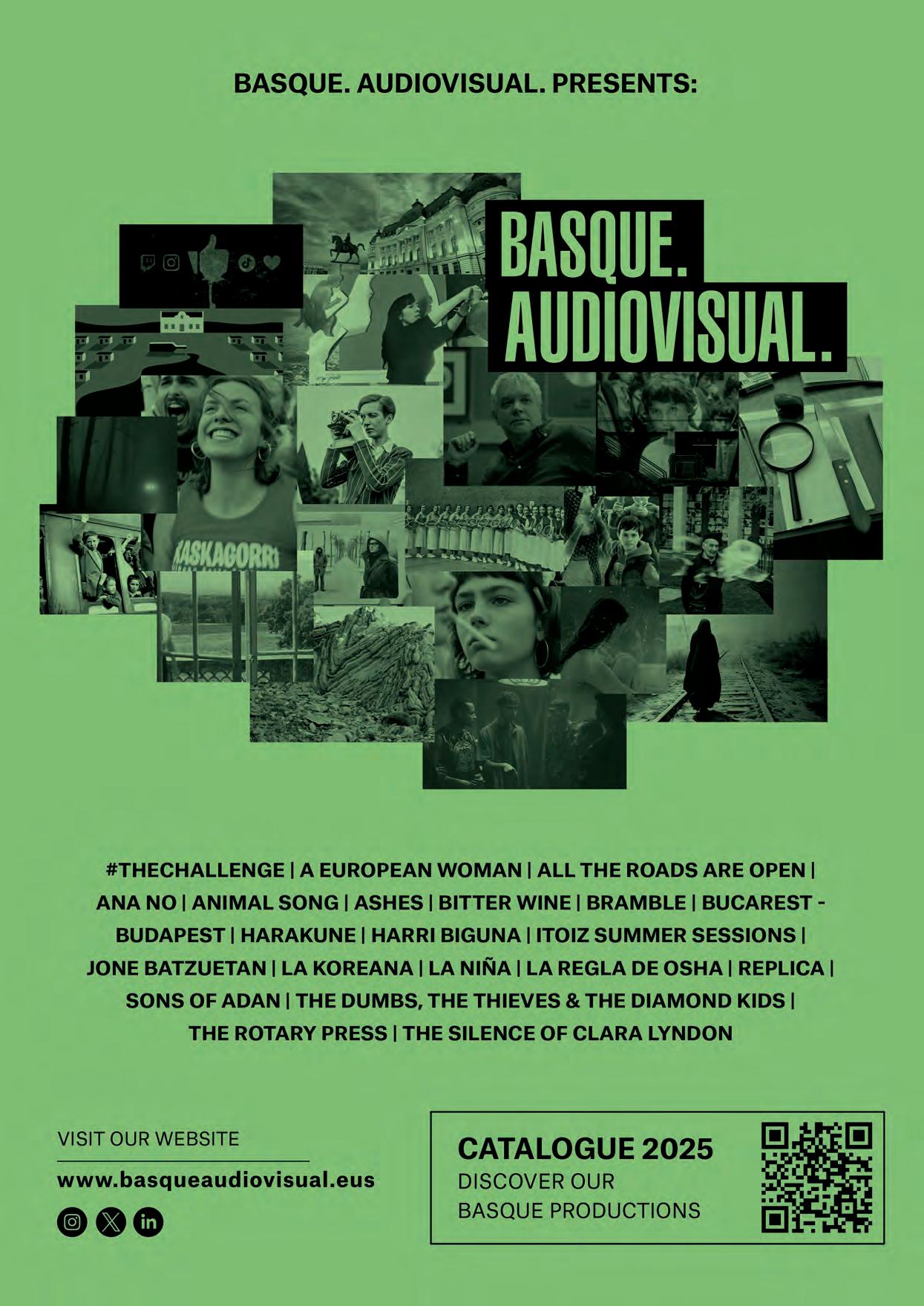

because there are 5 feature-film projects, out of the 35, that will seek for potential coproduction and funding partners.
One of the Spanish projects in Konbini, second feature-film from Pedro Collantes after the The Art of Return. Co-written by Tomoe Kanno and Sayaka Akitsu, the filmmaker dives into Japanese culture after his short films Serori and Ato San Nen . The story follows Kisayo, a struggling sound artist working night shifts at a Tokyo store who thwarts an old man’s plan to get jailed by blatantly shoplifting. An unlikely friendship forms, bridging two very different worlds. Produced by Aquí y Allí Films and Japanese Shinji Ogawa and Naoko Komuro, they are looking for co-producers, ideally from Europe, a sales agent as well as distribution and presales partnerships.
After her praised debut work, the rural surrealist drama Destello Bravío, Ainhoa Rodríguez will look for partners for her next feature film: Girl, Don’t Play. In addition to
the Spanish film Tentación Cabiria, the French company Les Films du Worso also participates in the production. Merging horror, surrealism, and suspense, it tells the story of a 6-year-old girl whose quiet life in a remote hostel is disrupted by a mysterious stranger, forcing her to face her mother’s hidden past while fighting to preserve their magical bond of love.
Arnau Vilaró, cowriter of Golden Bear film Alcarràs, which was directed by Carla Simón, has been selected with Men and Days, produced by Nanouk Films, Eddie Saeta and Local Films. The film tells the story of David Vilaseca, professor of literature at the University of London and pioneer of queer studies in Spain. He dedicated his life to writing his personal diary, a unique testimony about the construction of a gay identity in Barcelona in the 90s. The film is focused on the moment when Barcelona was a city that lived between the euphoria of the Olympics and the fear of AIDS.
At the Talent Project Market there are two Spanish projects. One of them is March 14th , directed by Alberto Gross Molo, a project that has been in the prestigious ECAM’s lab La Incubadora. Produced by Contraria Media and Ayhe Productions, the story focused on Héctor (11) and his sister Gema (6), who face the last 24 hours before their parents’ divorce trial, in which they will have to choose with whom they prefer to live from now on.
The other one is Death in Torrevieja by Adriana Arratia. The filmmaker wants to adapt her short film of the same name into a feature film. Produced by Nakamura Films and Maqueta Films, the story is set in the wild summer of Torrevieja, a coastal tourist town in Spain. Chetia, a single mother of an unwanted son, fights to survive each day through dealings and illegal balcony betting. Everything changes when a tourist dies at one of her parties.

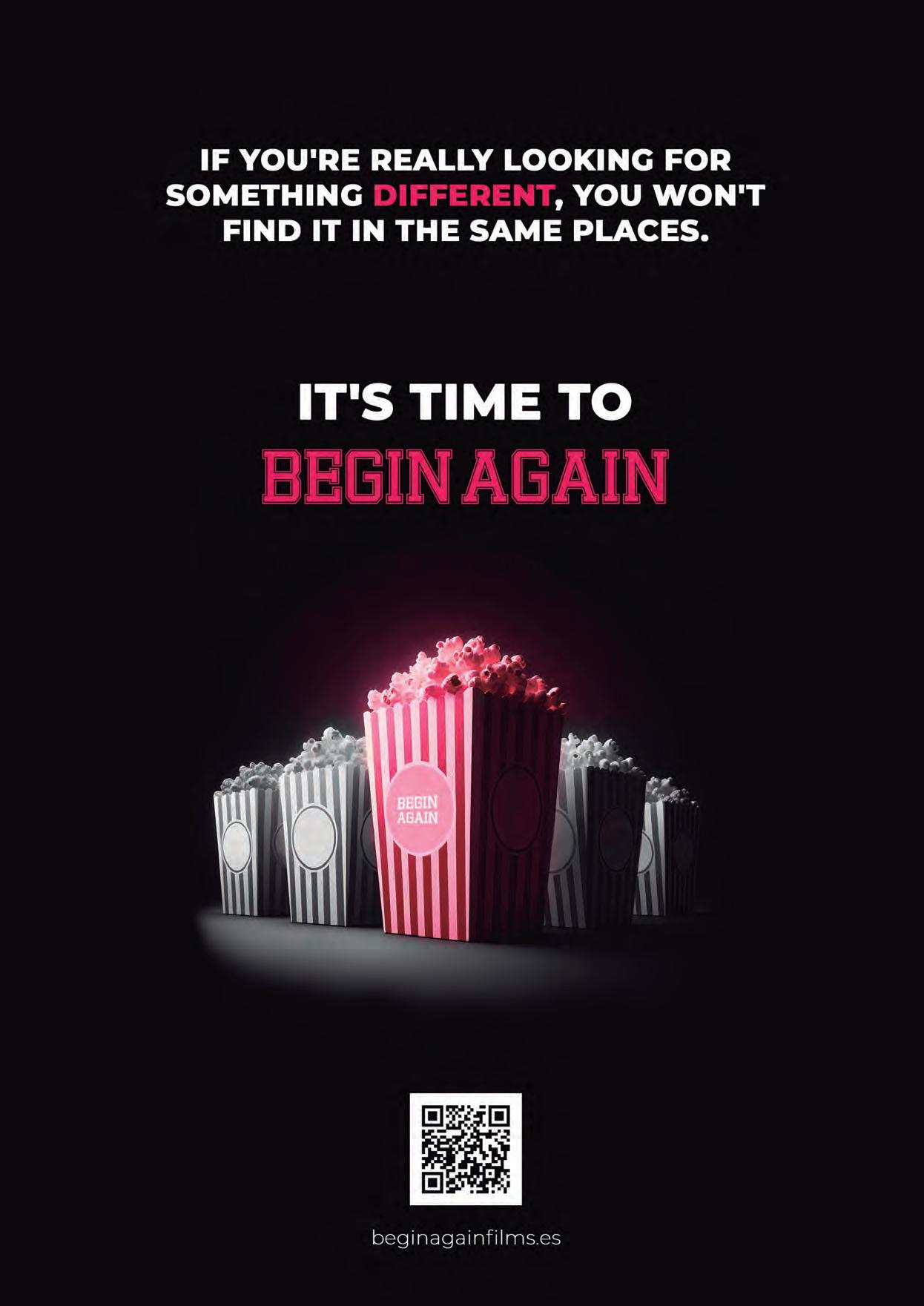
“THE
JUAN MANUEL GUIMERÁNS
CARLOS AGUILAR SAMBRICIO
The candidacy led by Juan Manuel Guimeráns won the elections recently held by the Spain Film Commission and a new phase is now beginning in a sweet moment for the association but also with the financial uncertainty related to the continuity or not of the Spain Audiovisual Hub plan (Spain AVS Hub), which mobilized public resources estimated at 1,603 million euros over the period 2021-2025.
Rubik: The Spain Audiovisual Hub plan has been fundamental for the growth of the film and TV industry in Spain. In theory, the plan ends in 2025. Based on the conversations you have with the Government, do they want to keep the support?
Juan Manuel Guimeráns: We have a very close relationship with the Government. It is obvious both to us and to them, and to the sector as a whole, that we cannot take a step back. The ‘Spain, Audiovisual Hub of Europe’ plan has been a success. There are elements to improve, refine and complement, but the objectives of multiplying screen production in Spain and making Spain the greatest
production center of the European Union have been achieved.
The thing is this is not a static market, it is a dynamic market. Other competing countries have stepped up and have reacted regarding tax incentives and other types of support. There are things to improve in Spain and they cannot be undertaken without resources.
“Adrian Wootton (British FC) told me that Shooting Locations is the most important event in this field in Europe. The 100% of the location managers who come also tells us the same thing”
We can´t go to the markets without resources and we cannot organize fam trips with international producers to show them the advantages of filming in Spain without resources. Or carry out studies that back the idea that this is a valuable industry for the country as a whole and not some people’s whim.
I believe that the Government’s will is very clear. What we have to see now is what the origin of these resources will be, if they are European funds, as they have mostly been until now, or if we have to look for an alternative, for example at the private field. We have to be brave and be open to looking for alternatives.
We also want to activate a new body calle Council of Patrons, a forum in which the major players of the Spanish screen sector can meet and collaborate with the Spain Film Commission to decide the projects we have to carry out so they can add value for the sector itself.
Rubik: One of the big projects with the Spain AVS Hub plan’s resources has been the economic impact report on international filming, presented a few months ago. What feedback have you had?
J.M.G.: Great feedback. I heard the former presidente Carlos Rosado say many times that one of the great feats of the Spain Film Commission had been convincing institutions to invest without having data. We had to use data from other countries. For many years we used reports from the British Film Commission or reports from publications around the world,
because they talked about the financial and fiscal return or the value of screen tourism. We had no real data on what was happening and what the impact was.
Now we have them and they are endorsed in a completely solvent manner, first by a prestigious international consulting firm such as Olsberg-SPI, and second by the production service companies themselves and the Tax Agency. The data is indisputable. It can be argued whether the impact is even greater, because we have not been able to access 100% of the data. The fact of the return of 9 euros for every euro is important but there is also more than 2 euros returned to the State itself.
In addition, the employment impact is huge. International filming in Spain, on average in those four years taken into account in the study, including the year of the pandemic, generated 7,000 full-time jobs annually. This is extraordinary, especially for a field that usually has the label of being a minor sector, as unfortunately happens to many cultural industries.
So if I could only have money for one thing, I would tell you that rather than going to the markets, I would invest it in commissioning studies. We could incorporate elements such as non-incentivized filming, TV activity, streaming, video games, VFX, postproduction... Also incorporate elements with a gender perspective, because we have not been able to go deeper.
Out of the feedback we’ve got, the one that seems most valuable to me is foreign. There are several foreign film commissions and several studios from outside Spain that have called us because they want to do that kind of research as well.
Rubik: Virtual production, at first, was viewed with skepticism, as an enemy of film commissions and the attraction of film shoots. How should the use of virtual scenarios be managed?
J.M.G.: More than with skepticism, I would say that it was seen with fear. It is a super complex topic. We have been able to launch the White Paper on Virtual Production, which is a pioneering publication. It addresses everything from technological issues to legal issues. It is a very controversial and very complex issue to tackle because it is very difficult to regulate a technology that is in development.
We must go to principles and standards that are also accepted and assumed by the

industry. I would be very reckless if I told you what I think is going to happen, because I don’t think anyone knows. What is certain is that, until now, no matter how much virtual fans may say otherwise, the room for virtual production is still small.
There were some fears in the way of ‘this is over, there will no longer be a need for location managers or locations’. But right now more people are shooting in real locations than ever. But, as with artificial intelligence, it is something we will have to manage. I honestly don’t know how it will be done, but I do know one thing: the public sector will have to have a voice in this, this cannot be something that is exclusively in the hands of the market.
Rubik: What is your assessment of Shooting Locations, an event that Spain Film Commission co-organizes?
J.M.G.: I go to many events, fairs and markets and I don’t know of any other than Shooting Locations in which 100% of the people I talk to tell me that they are satisfied.
It is an event that is relatively small and perhaps that is one of the reasons. It is a boutique event where there is a human measure of everything and the participants feel like they are protagonists and are treated very well. I have to give credit to Feria de Valladolid team because they are the ones who take extreme care of all the participants.
The evaluation is very positive. I realized its value when an icon like Adrian Wootton, head of the British Film Commission and

“Virtual Production was viewed with fear by film commissioners. It is a very controversial and complex issue to tackle because it is very difficult to regulate a technology in development”
Film London, told me in Valladolid that this was the most important event in this field in Europe. He may be a very kind man, which
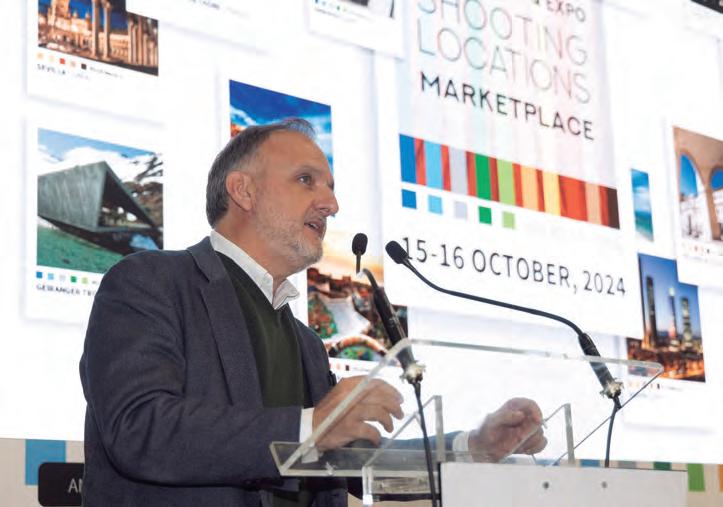
he is, but 100% of the location managers who come also tells us the same thing.
They come because it has value and if the number of film commissions grows it is also because it has value. And now we also have not only location managers and film commission, but executive producers. There are round tables with people of an outstanding level from US companies, that you don’t see in other markets and festivals.
Rubik: What first measures would you like to take in this new stage?
J.M.G.: There is a first measure that is fundamental, because many of the things that we will be able to do in the coming years depend on it: the economic and financial sustainability of the association. Thanks to the Hub, we have had great activity in recent years, and now we have to work hard so that we have the amount of resources we need.
The second objective is that I would like 100% of the members to be involved in work groups, so that where we do not reach with resources, we reach with people.
The third objective is to look after the most immediate commitments. Berlinale is coming up with Spain as the Country in Focus, and we will continue to maintain relations with other countries.
In fact, the President of the Spanish Government was recently in India and met with Indian producers in Bombay. The reception was very positive and we want to increase collaboration with India. Afterwards, Spain Film Commission was invited by the Indian government to participate in the most important market there, which takes place in Goa.


SPAIN IS THE FOCUS COUNTRY IN THE EUROPEAN FILM MARKET - EFM 2025, THAT TAKES PLACE FROM FEBRUARY 13 TO 19. THE SPANISH DELEGATION IS ALWAYS ONE OF THE MOST VIBRANT IN THE MARKET BUT, WITH THIS GLOBAL SHOWCASE, SPANISH CREATORS WILL HAVE MORE NETWORKING OPPORTUNITIES. HERE YOU CAN FIND THE MAIN EVENTS OF THE SPAIN IN FOCUS PROGRAMME THAT INSTITUTE OF CINEMATOGRAPHY AND AUDIOVISUAL ARTS (ICAA) AND ICEX SPAIN TRADE AND INVESTMENT HAVE ARRANGED.
The Cinema from Spain Pavilion at the EFM, powered by ICEX in collaboration with ICAA, is located at booth C1 of the Gropius Bau, as always. There are 83 companies attending under this umbrella and 21 are exhibitors: sales companies and distributors Begin Again Films, Bendita Film Sales, Feelsales, Latido Films, Mercury Films, Movistar Plus+ International and Sideral Cinema; film commissions and regional public bodies Andalucia Film Commission and Andalucía Cultura, Basque. Audiovisual., Canary Islands Film, Catalan Films, EGEDA, Films from Galicia, Madrid Film Office, Navarra Film Industry, Shooting in Spain and Spain Film Commission; and companies like Scout & Film, Secuoya Studios or The Film Agency. For the second time, Catalan Films will set up the Catalan Films Corner at the Innovation and Producers Hub. Stand 210
(2nd floor Gropius Bau) for more relaxed meetings.
Besides this area, at the Marriott Hotel, Spanish sales companies Filmax (#270/272) and Film Factory (#274/276) have rooms for meetings.
Berlinale Talents will gather this year 12 promising professionals from Spain: Pau Aulí (production designer), Araceli Isaac Delso (producer), Susana Fernández (curator, programmer, audience designer), Pilar Moreno (director, writer), Laura Egidos (producer), Gerard Borrás (editor, director), Adrián Saba (director, writer), Rubén Téllez (journalist, film critic), Juan Sebastián Vásquez (director, writer), Valeria Sorolla (actress), Gerard Rodríguez (producer) and María Elorza (director, editor).
THURSDAY 13TH AND FRIDAY 14TH
The Spanish Minister of Culture, Ernest Urtasun, will have an informal
breakfast organised by ICAA to meet the Spanish Delegation attending the market at the Cinema from Spain pavillion on Thursday 13th (12 pm).
Friday 14th is an important day. First of all, there´s a breakfast organised by Invest in Spain with German producers (by invitation only) at the Hotel Berlin Postdamer Platz (former Crowne Plaza) at 9 am.
One hour later, at 10 am, Producers Hub (Gropius Bau 2nd floor) will host the Spanish Producers Spotlight: ten producers will present their developing film projects. We have an in-depth article about this initiative in the following pages.
Speaking of producers there are also ten selected producers for the CoProduction Market Visitors Programme trying to find the best partner. They are Andrea Gautier (Smiz and Pixel), Anna Giralt (Artefacto Films), Mireia Graell (Ringo Media), Néstor López (Filmakers Monkeys), Ines Massa (Materia Cinema),

Txelu Medina (Pimpi & Nella Films), Álvaro de Miguel (Shift Dif), Mario Pagano (Good Friends Pictures), Araceli Pérez-Rastrilla (La Vida) y Javier Rodríguez (Producciones La Cochera).
From 10 am to 1 pm, Catalan Films has arranged meetings for catalan producers
with film market execs from Baltic States (Tallinn Black Nights), Colombia (BAM Bogotá), United Kingdom (Film London and the Production Finance Market), Italia (When East Meets West) and Nordic Region (Goteborg Nordic Film Market) at the Catalan Films Corner. This is part
of the initiative Road to Tallinn 2025 , because Catalunya will Focus Country in november in Black Nights.
This morning, industry professionals will be able to attend the presentation of the 8th edition of Gaztelfilm Fest, a film festival made by and for the children. There’s no badge needed and it will be at the Instituto Cervantes at 12:30 pm.
Later in the day, at 4:30 pm, there will be a Coproduction meeting coordinated between Proimágenes Colombia and ICAA at the Cinema from Spain pavillion (previous registration).
Spanish public bodies have also aimed at another Latam country: Uruguay. At Saturday 15th (10 am), there will be a Coproduction meeting coordinated between ACAU and ICAA at the Cinema from Spain pavillion (previous registration).
Saturday is also the Country Session day. Representatives from Spain (ICAA, ICEX) and Catalonia (Catalunya FC and Catalan Films) will give short overviews and answer questions on co-producing and financing access at the Octogon (3 pm).
To wrap this day, the best option is ‘¡Fiesta Andalucía!’, the Andalusian party at Berliner Freiheit at 7 pm (by invitation only).

Sunday begins at 10 am at the Cinema from Spani pavillion with the Breakfast with UK , co-presented with Spain Film Commission (by invitation only).
Cinemaxx Lounge will host at 12 pm (with market badge) a presentation and networking reception by Navarra Film Industry, which will provide an insight on the booming audiovisual ecosystem of the region. An opportunity to learn firsthand the advantages of working in Navarre.
In the afternoon, the Documentation Centre hosts EFM Startups . Spanish company Gretico will present its project DCS (Digital Cinema Streaming), a small device for content distribution that allows to transform any venue into a cinema.
Also, there´s another Country Session where there is Spanish participation. At 3:30 pm, the Octogon will have Basque. Audiovisual . and Canary Islands Film giving information about co-production and access to financing in their regions.
Cinema from Spain pavillion will have the ‘New Horizon Snack’, a coproduction meeting between European producers who produce works aimed at young people and children at 4 pm (by invitation only).
Two more events for this busy sunday: the film school ECAM will present the
second edition of its coproduction market ECAM FORUM at the Business Lounge at 6 pm (with market badge) and Basque. Audiovisual. will present Film Basque Country , a new gateway to opportunities, locations & incentives at the Conference Lounge at 5:15 pm (with market badge).
Artificial Intelligence is the hot topic nowadays, also in the screen industry. Instituto Cervantes will a hold at 12 pm (no badge needed) a couple of rountables (‘Towards an ethical and responsible AI: opportunities and challenges generated by its use in the audiovisual sector’ and ‘Towards a diverse and inclusive AI: analysis of the socio-cultural bias represented by international data lakes’), followed by a networking cocktail.
Monday afternoon is full of Spanish flavoured activities. First of all, the Co-Pro Meeting Hall will be the place for the Fund Meetings (2pm – 6 pm).
There will be several events related to the Berlinale Series Market. At the CinemaxX 1 (4 pm, with market badge), in collaboration with Iberseries & Platino, there will a panel on Spanish Thrillers , highlighting Spain’s strong state of this genre, where creators incorporate current
social themes with global impact into its plots. Mediacrest and RTVE will talk about Internal Affairs and Secuoya and SkyShowtime will share their experiences with Shades.
Right after that, at the CinemaxX 3 8at 5 pm, (with market badge), there will be an event called The Spanish Connection, which will be comprised of 4 Series Pitches by Dark Waters (María Rocher, Federation Spain), Pink Noise (Álvaro León, La Mola Studio), The Wheel (David Matamoros, Mr. Miyagi Films) and True North (Horacio Alcalá, The Aurora Project).
Spanish Embassy in Berlin will host, at 6:30 pm (by invitation only), the panel ‘Spain Audiovisual Hub – A Model of Success’ , a conversation with a selected group of both public and private industry representatives about the experience of the Spanish Audiovisual Hub in which the main features and the latest economic data will be provided. The second part of the event will consist of a panel showcasing the diversity and very positive results of this initiative.
To cap it all, the Spanish Night. Mirror Tent will be the place at 10 pm (with invitation only) for the Spanish party, a great opportunity to mix and mingle with the Spanish delegation and celebrate the Spain in Focus edition.
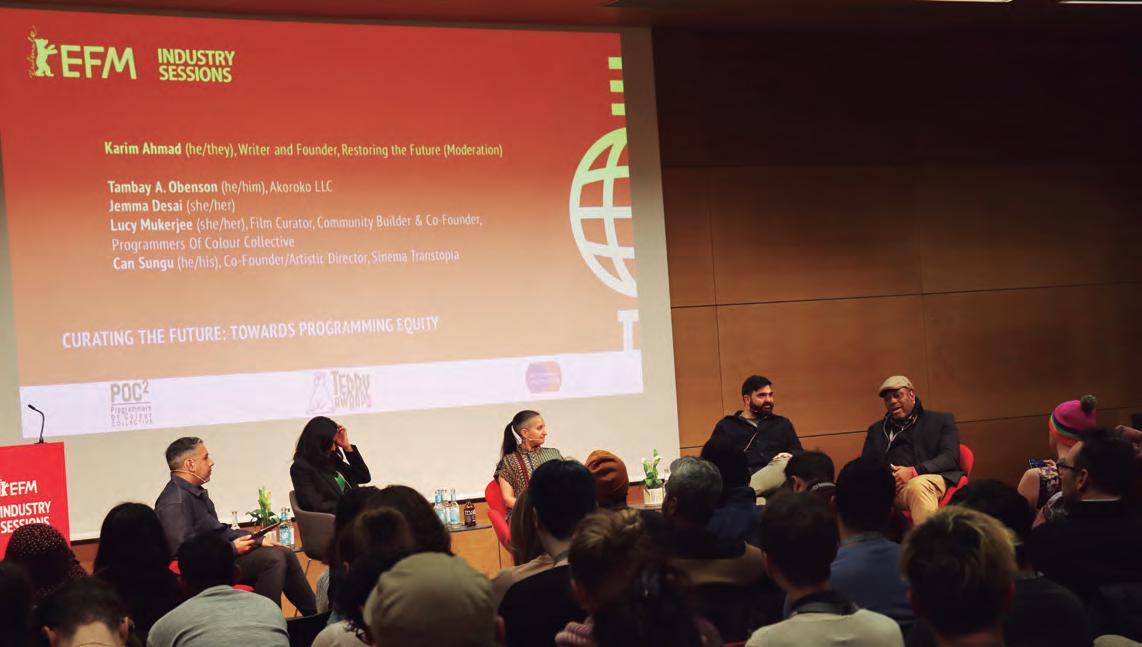

AS PART OF THE COUNTRY IN FOCUS PROGRAMME, THERE ARE 10 SELECTED PRODUCERS WITHIN THE FRAMEWORK SPANISH PRODUCERS SPOTLIGHT, AN INITIATIVE WHERE THEY WILL PRESENT THEIR COMPANIES AND THE PROJECTS THEY ARE CURRENTLY WORKING ON. RUBIK HAS REACHED THEM IN ORDER TO PROVIDE INFORMATION ABOUT THEM FOR POTENTIAL BUSINESS
OPPORTUNITIES WITH GLOBAL PRODUCERS, DISTRIBUTORS AND SALES COMPANIES.

ABOUT ESCÁNDALO FILMS: “Escándalo Films is a production company with a vast experience in the Spanish film industry. We support young auteurs and directors with the aim of finding young new talent and producing exciting, fresh and relevant stories.
Our feature films and series have successfully pleased critics, audience and festivals, such as the Goya Award for Best New Director with ‘Three Days with the Family’, 68th Venice Special Jury Mention for ‘Eva’ or Locarn Special Mention for ‘Salve María’, among others (…) This year we´ll premiere in Berlinale the short film ‘Close to September’ (Lucia G. Romero, 2025)”.
PROJECTS IN DEVELOPMENT: “Sara Fantova’s feature film ‘Jone, Sometimes’ is a coming-of-age story set during Bilbao’s Semana Grande

festivities (…) The film will premiere at the 2025 edition of the Malaga Film Festival (…) We are looking for a sales agent.
‘A Commonplace’ is directed by Celia Giraldo, who won this year’s Gaudi Award for Best New Director. It´s a liberating comedy that confronts the invisible weight of caregiving in motherhood. It was premiered in D’A Film Festival in April 2024. Currently looking for an international sales agent.
‘Boiling Over’ is a story of two very different mothers, waitress Benita (37) and council worker Adela (47), who have something in common: their sons are both in jail. It´s the third film of Marta Díaz De Lopez Diaz, known for redefining women’s roles in Spanish comedy. We are looking for international coproducers and distributors
‘The Dreamers’, created by Olga Hernandez and Jamie Southon, is a thrilling youth series that explores the dangers of cryptocurrency and self-made wealth (…) Currently under development, with a pilot written. We are looking for international coproduction or platforms buyers. ‘Wonder Boy’ is a coming-of-age that redefines masculinity, through the lens of a young boy with a genetic height condition. Based on the own story of director David Heredia, the film is set in the Spanish 90s (…) We are looking for international coproducers and sales agents”.
ABOUT AVALON PC: “We strive to find unique voices and produce films for the international market while embracing diversity. Supporting emerging talent is also in Avalon’s DNA. Avalon has a proven track record of nurturing new talent, as evidenced by producing filmmakers like Carla Simón (‘Alcarràs’, 2022 Golden Bear Winner; ‘Summer 1993’, Best First Feature Award at Berlinale) , Clara Roquet (‘Libertad’, Semaine de la Critique), Álvaro Gago (‘Matria’, Berlinale Panorama), and Elena Martín Gimeno (‘Creatura’, Best European Film at Cannes’ Director’s Fortnight), among others”.
PROJECTS IN DEVELOPMENT : “We are attending the EFM with several projects. We’d love to highlight ‘Since You’ve Been Gone’ , the
debut feature by María Herrera, whose short film ‘A Midnight Summer Tale’ we recently produced. It celebrates a Spanish housewife from a lower-middle-class background. Under Herrera’s singular vision, longoverlooked care work is elevated through color, humor, and the beauty of daily routines.
Also , ‘Basarda’ (Salvador Sunyer), currently in development and written by award-winning Eduard Sola, was selected for Les Arcs Co-Production Village and has already secured support from ICEC and MEDIA Creative Europe. The film, set in the 1950s, explores the buried conflicts underlying the family institution across generations, presenting the home as both a refuge and an inevitable source of tension.
We are looking for potential co-producers—primarily from European countries but also open to exploring other territories—as well as an international sales agent who connect with the essence of these projects. Our aim is to have them on board during development, as we believe earlystage collaboration is highly beneficial for the projects”.
ABOUT MORENA FILMS: “I believe one thing that has always defined Morena Films is our commitment to bringing stories that truly matter to the screen. We produce both feature films and series, in both fiction and non-fiction. Two of our feature films, Champions and Cell 211, in addition to winning the Goya Award for Best Film, are among the highest-grossing Spanish films of all time. At the same time, Morena Films also won the Goya Award for Best Documentary Film for Sons of the Clouds – The Last Colony. These three titles are a good reflection that there’s no genre we favor over another. (…) What I believe defines us is our intention to produce innovative, high-quality content with a clear commercial ambition for both the national and international markets, which often leads us to finance through international co-productions.”
PROJECTS IN DEVELOPMENT: “I am currently working on a youth horror feature film titled ‘Eco’, which will be the directorial debut of Nacho Solana, who has had an impressive career in the short film world, having won
awards such as the Méliès de Plata in 2023. It tells the story of a teenager who discovers that she can hear the echoes left by her twin sister, allowing her to uncover who killed her. I’m convinced this is a film with great potential to be financed through a European co-production.
Álvaro Longoria is developing a bigbudget production about Malinche and the conquest of Mexico, directed by Pablo Trapero; Juan Gordon is finishing post-production on ‘También esto pasará’, the new film by María Ripoll based on the popular novel by Milena Busquets; and Merry Colomer and María Soler will be releasing ‘Miss Carbón’, a Spanish-Argentine co-production directed by Agustina Macri, in the coming months.”
ABOUT INICIA FILMS: “At Inicia Films, we see production as a powerful tool to influence society and forge emotional connections with audiences. Since 2006, we have been dedicated to nurturing a new generation of filmmakers, amplifying their voices in today’s ever-evolving audiovisual landscape. Guided by the vision of our creators and the sensitivity of our authors, we support the development of international projects and multicultural talent, bridging their global experiences with their cultural roots”.
Films produced and co-produced by Inicia Films have been widely acclaimed, with selections and awards at prestigious festivals worldwide. Notable works include Glimmers (Pilar Palomero, 2024); Queens (Klaudia Reynicke, 2024); 20,000 Species of Bees (Estíbaliz Urresola, 2023), Schoolgirls (Pilar Palomero, 2020) and Summer 1993 (Carla Simón, 2017), amongst others.


PROJECTS IN DEVELOPMENT: Among their projects seeking co-producers and international sales agents are Juana Domínguez, feature film by Pilar Palomero (in co-production with Bteam Prods), it´s a historical drama seeking for international sales agents and european co-producers; Las que se fueron, fiction feature film by David Ilundain; it´s a coming-of-age story seeking for international sales agents and european co-producers; La Yoli, fiction feature film, debut by Sandra Reina; it´s a feel-good drama seeking for international sales agents and european co-producers; and La mano guiada, TV series by Carlos Marques-Marcet; it´s a historical psychological drama seeking for TV and international co-producers.
ABOUT PECADO FILMS: Pecado Films is an independent audiovisual production company founded in 2008. Among its projects, it stands out for ambitious high-budget fiction feature films, such as Close Your Eyes by Víctor Erice (S.O. Cannes Premiere 2023), and May I Speak with the Enemy? by Alexis Morante (Gala RTVE - San Sebastián 2024); as well as other projects with more modest budgets, like Mamacruz by Patricia Ortega (Sundance - World Dramatic Competition 2023), and Journey to a Mother´s Room by Celia Rico Clavellino (San Sebastián - New Directors 2018). “All these projects share a common thread: their auteur vision and ambition to connect with the audience. This is our philosophy: to produce auteur-driven projects that aim to captivate both national and international audiences”.
PROJECTS IN DEVELOPMENT: “We are looking for international sales agents for our fiction feature film in post-production, ‘A la cara’, the second film by Javier Marco, which is based on the short film of the same name that won the Goya in 2021.
We are also in the financing stage of ‘El gran bazar de mis padres’, the first film by Rakesh Narwani, with which we participated in the ESCAC Ópera Prima lab. This project, co-written by Rakesh and Goya winner Marina Parés, tells the story of the Sadhwani family from Málaga, originally from India, who must face the closure of their family business (…) It is one of the first Spanish fictions about the second generation of migrants at our borders, told from their own perspective (...) For this project, we are looking for Spanish distributors, sales agents, and Indian and European co-producers.

We also have other projects in development and are looking for partners. We’ve come to the EFM to discover projects from other international producers in which we can participate as minority co-producers.”

ABOUT ALBA SOTORRA SL
“We’re romantics who believe in cinema as a powerful agent of change. That’s why we engage with transgressive films —both in form and content— that carry a feminist perspective and address social issues. We’re interested in character-driven stories told by nonmainstream voices who share a deep personal connection with their narratives, with a focus on female and queer scriptwriters and directors. We produce live-action, animated, and documentary films with strong festival potential while remaining accessible to audiences. We have extensive experience in international co-productions and enjoy collaborating with teams that stay creatively involved at every stage. As
a member of EAVE and ACE Producers, we benefit from a robust global network of industry professionals”.
We’re seeking partners for our new fiction feature, ‘Querer vivir un grito’ (the second film by Diana Toucedo). It follows a dedicated human rights activist who confronts the very system she serves, forcing her to question her identity and the values she once held dear. Already in coproduction with Greece, we’re now looking for a French co-producer. We’re also developing two animated feature films for which we’re seeking European partners.
As minority co-producers, we’re seeking for projects led by women and queer teams . We are dedicated, hard-working partners, eager to invest our creativity and expertise to ensure the film’s success. Based in Barcelona, we can access both regional and national funds (totaling up to 600k)”.

“We are passionate about bold and innovative cinema, the kind that challenges conventions and, from a unique and personal perspective, manages to connect emotionally with a global audience (...) We seek projects that combine a clear auteur vision with a narrative that is accessible and appealing to the audience, offering a unique sensitivity to universal themes. (…) Since 2019, all of our productions have been international co-productions, working on stories set in countries such as Costa Rica, Puerto Rico, Mexico, and Argentina (...) We strongly believe in co-production as a model.”
“We are working on ‘Tres edades’ , the directorial debut of Jiajie Yu Yan, a Catalan director of Chinese origin. It is a nostalgic drama with a luminous tone that tells the story of Xiaowei’s journey, from her arrival at the age of 7 in Barcelona during the 1992 Olympic Games, to her
departure at 23, after the 2008 economic crisis (...) We are looking for co-producer partners from countries with a significant Chinese community, and that have minority co-production funds. We are also developing the feature film ‘March 14th’ (Talent Project Market at Berlinale) (…) The film explores the love between an older brother and his younger sister on the eve of their parents’ divorce trial, when they must decide who to live with (…) We are looking for international co-producers and a sales agent.
Additionally, we are presenting the project ‘Ayer te querré’ , the second feature film by director Guillermo Benet (…) It is a bright and magical film that covers the key moments in Julia’s life, from her birth to her death, constructing the story of a complete existence (…) At Berlinale, we are looking for Portuguese and Galician co-producers, as part of the film takes place in Portuguese and Galician regions”.
Other projects include the directorial debut of Celia de Molina, ‘No soy universal’, co-produced with Pecado Films, for which they are seeking international producers interested in auteur comedies that are accessible to a wider audience; and they are finishing the financing of ‘Hermanas’ by Ione Hernández, co-produced with Elastica, Gariza, and ISB, for which they are looking for a sales company”.

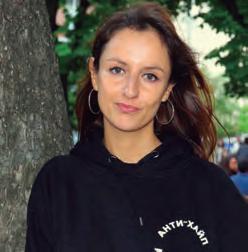
ABOUT BATIAK FILMS: “We make independent cinema with international reach. Our films share the common thread of presenting an auteur perspective and supporting emerging talent. We approach production solely from a creative support standpoint, adapting to each project, because every story is unique and requires a specific way of being produced.”
Since its founding at the end of 2021, they have already released 5 productions: 3 feature films and 2 short films. Their projects have been premiered at prestigious festivals such as Berlinale, Karlovy Vary, Cartagena de Indias, SXSW, Mar del Plata, Seminci, Miami, and more.
PROJECTS IN DEVELOPMENT: “’Alegre y Olé’ is a celebration of life through affection, tolerance, and a love for cinema. It is the directorial debut of Clara Santaolaya, who tackles an autobiographical experience and affirms that our past does not define us and that we can always rebuild ourselves through mutual understanding and hope. It is a co-production between Batiak Films, Capitán Araña, Guion Alto (Spain), and La Soga Producciones (Peru). We have been developing the project at Ventana CineMad, TorinoFilmLab Extended, EFM Co-production Market, Co-production Forum TIFF, Ventana Sur-Punto Género, etc. Right now, we are looking for a French co-producer, as well as a distributor and sales company.
‘Perro Viejo’ is a project in the early stages of development in the form of an ambitious psychological thriller that embraces the power of storytelling, where social drama erupts into a hidden violence soaked in suspense, with moments of dreamlike escape blending tones and formats (…) It is written and directed by Alejandro Cortés Calahorra and has already been selected for labs such as isLABentura and CIIF Market.”

ABOUT LA CIMA PRODUCCIONES: “We have a strong drive to tell meaningful stories, ones that speak about us, about our country. Cinema as a political expression, a cinema that helps us understand and reflect on the past and the present, deeply connecting with the viewer and their own stories, with their own way of seeing the world. We saw this with ‘The Year of the Discovery’ by Luis López Carrasco, which won the Goya Award for Best Documentary and Best Editing, or ‘Afternoon of Solitude’ by Albert Serra, which won the Golden Shell at San Sebastián.
At LaCima, we produce both feature films and series, in both fiction and documentary genres. This year, in addition to ‘Afternoon of Solitude’, we will
premiere ‘On eres quan hi eres’ by Jana Montllor at the Málaga Film Festival and ‘A la cara’ by Javier Marco.”
PROJECTS IN DEVELOPMENT: “We are in the midst of an expansion process. We are finishing post-production on three films, all of which are coproductions with Europe or Latin America. Our goal for the next five years is to produce an average of 3 feature films and 1 TV series per year. We are looking for international partners to finance our upcoming projects: four high-budget fiction feature films that are either in development or already in the financing phase. Independent production relies on the ability to create collaborative networks with producers from different countries. The current production landscape in Spain, with increasingly tight funding plans and higher budgets, means that all the projects mentioned require international co-production to become a reality.”

ABOUT SIDERAL CINEMA: “We are a film production and distribution company committed to connecting unique stories with the right audience. Our mission is to be a trusted hub for filmmakers with a personal and authentic vision, selecting projects that inspire us and offering audiences films that go beyond the conventional and spark meaningful connections. Some of our productions are ‘Still Life with Ghosts’ (Enrique Buleo), ‘Close to the Sultan’ (Javier Rebollo), ‘From My Cold Dead Hands’ (Javier Horcajada), ‘The Fantastic Golem Affairs’ (Burnin’ Percebes) or ‘Girl Unknown’ (Pablo Maqueda), among others”.
PROJECTS IN DEVELOPMENT: Our upcoming productions include ‘The Dashed Lines’ (Anxos Fazáns), for which we are looking for festival programmers to select this auteur drama full of optimism for the future; ‘Cheaper than Stealing’ (Pedro Collantes), for which we are seeking a French sales agent for this dark comedy, which is a co-production with France; ‘Death in Your Eyes’ (Guillermo de Oliveira), a Galician film noir based on real events; and ‘In the Flesh’ (Ainhoa Menéndez), a film about loneliness and toxic love in the form of a horror genre. What we look for in potential co-productions is, first, the type of project— whether it has any distinguishing elements, both in terms of its theme and production system. Next, we focus on the talent behind it, as we want to establish long-term relationships with people who inspire us and with whom we get along, so we can support both directors and production companies in their careers. Lastly, we also look for some original selling point that will facilitate sales”.

Manas
Dir. Marianna Brennand
Feb 16th (Sun) 12:50 pm @ CinemaxX 10
Feb 17th (Mon) 1:05 pm @ CinemaxX 16

Barren Land (Tierra de nadie)
Dir. Alberto Pintó
Feb 13th (Thu) 2:30 pm @ CinemaxX 10
Mikaela
Dir. Daniel Calparsoro
Feb 13th (Thu) 10:45 am @ Arsenal 2
The Goldsmith’s Secret (El secreto del orfebre)
Dir. Olga Osorio
Feb 15th (Sat) 10:40 am @ CinemaxX 9
Undercover (La infiltrada)
Dir. Arantxa Echevarría
Feb 14th (Fri) 11:00 am @ Cinemobile - Gropius Bau
Wolfgang
Dir. Javier Ruiz Caldera
Feb 16th (Sun) 12:05 pm @ CinemaxX 5
Toxic
Dir. Saulè Bliuvaitè
Feb 16th (Sun) 4:00 pm @ dffb-Kino
The Devil Smokes (El diablo fuma)
Dir. Ernesto Martínez Bucio
Feb 13th (Thu) 4:45 pm @ Bluemax Theater (Press)
Feb 15th (Sat) 3:30 pm @ Bluemax Theater (World Premiere)
Feb 16th (Sun) 10:00 pm @ Cubix 6
Feb 17th (Mon) 6:30 pm @ Cubix 8
Feb 18th (Tue) 12:30 pm @ Colosseum 1
Feb 22th (Sat) 9:30 pm @ Cubix 8
Natural Phenomena (Fenómenos naturales)
Dir. Marcos Díaz Sosa
Feb 18th (Tue) 12:30 pm @ CinemaxX 16
Zafari - Dir. Mariana Rondón
Feb 18th (Tue) 4:10 pm @ CinemaxX 16

8
Dir. Julio Medem
Feb 16th (Sun) 12:50 pm @ CinemaxX 2
Feb 17th (Monda) 11:00 am @ dffb-Kino
Deaf (Sorda) Dir. Eva Libertad
Feb 15th (Sat) 5:30 pm @ Haus der Berliner Festpiele (World Premiere)
Feb 16th (Sun) 10:00 am @ Cubix 9
Feb 17th (Mon) 9:00 am @ Arsenal 2 (Market Screening)
Feb 17th (Mon) 1:00 pm @ Cubix 7
Feb 18th (Tue) 4:30 pm @ Cubix 5
Feb 22th (Sat) 2:45 pm @ Urania
Feb 23th (Sun) 4:30 pm @ Urania
Over Babel (Llueve sobre Babel)
Dir. Gala del Sol
Feb 14th (Fri) 10:40 am @ CinemaxX 4
Feb 17th (Mon) 10:50 am @ Arsenal 2
Raqqa: Spy vs. Spy (Raqa) - Dir. Gerardo Herrero
Feb 16th (Sun) 11:00 am @ CinemaxX 10
The Flamenco Guitar of Yerai Cortés (La guitarra flamenca de Yerai Cortés) Dir. Antón Álvarez (C. Tangana)
Feb 15th (Sat) 10:25 am @ Cinemobile

There will be market screenings for Fury (La furia), My Friend Eva (Mi amiga Eva), The Virgin of the Quarry Lake (La virgen de la tosquera), May I Speak with the Enemy? (¿Es el enemigo? La película de Gila), The Light of Aisha (La luz de Aisha), La Joia: Bad Gyal, From Good to the Hood (Al otro barrio), and Dismantling an Elephant (Desmontando un elefante). However they will be private, so they will be sending invitations to international distributors.
You can contact them at filmaxint@filmax.com

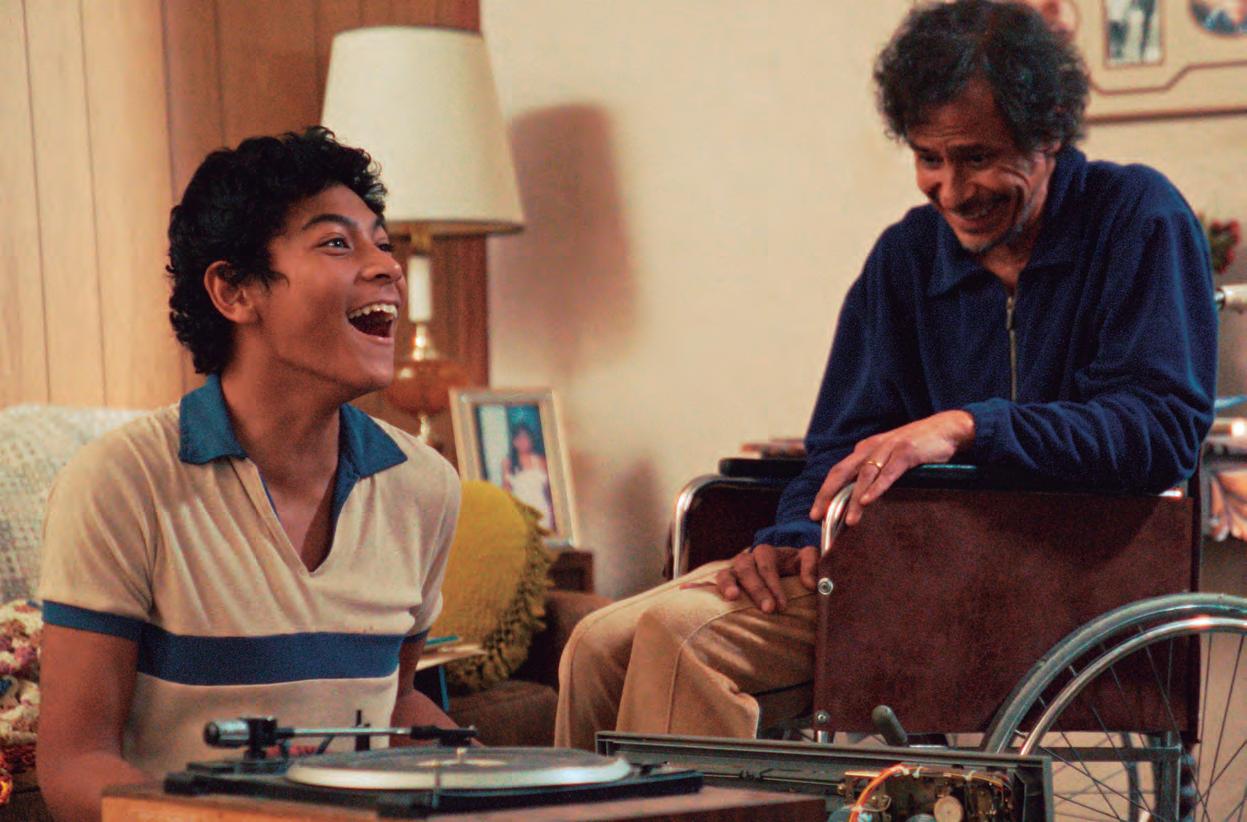
AS WE STATED IN THE FIRST PAGES OF THIS ISSUE, THERE ARE THREE LATIN AMERICAN FILMMAKERS IN CONTENTION FOR THE GOLDEN BEAR (BRAZILIAN GABRIEL MASCARO WITH O ÚLTIMO AZUL - THE BLUE TRAIL, ARGENTINE IVÁN FUND WITH THE MESSAGE AND MEXICAN MICHEL FRANCO WITH DREAMS). BUT THERE’S QUITE A LOT LATAM CINEMA THROUGHOUT THE VARIOUS SECTIONS OF BERLINALE. LET´S TAKE A LOOK AT THEM —AND THE PORTUGUESE CINEMA— IN THE FESTIVAL.


Brazilian director Anna Muylaert, famous for The Second Mother, is back with the feature film The Best Mother in the World, which will be premiere in Berlinale Special. To escape her abusive husband, It revolves around garbage collector Gal who, in order to escape her abusive husband, packs her two young children, Rihanna and
Benin, onto the top of her cart and heads across São Paulo to her cousin’s house. As she struggles to avoid the dangers of the streets along the way, she convinces the children that they are on a big and exciting adventure.
Panorama is packed with several Latam productions. One is also from Brasil Ato noturno (Night Stage), a film directed by Marcio Reolon. It tells the story of Matias, an ambitious 23-year-old actor who is rehearsing a play with a prestigious theatre company. He and his flatmate Fabio, also 23, are playing the main roles. The two catch the eye of casting agent Pamela who is looking for actors for a major series production to be filmed in the city. However, only Fabio is invited to the audition. Devastated, Matias takes solace in meeting 35-year-old Rafael, a mysterious man who refuses to reveal much about himself. Together, they discover a fetish for having sex in public places. Matias soon finds out that Rafael is a closeted politician who is running for mayor. M-Appeal is the sales company of this erotic thriller.
Fernando Eimbcke (Duck Season, Lake Tahoe) is one of the most prestigious Mexican filmmakers in the landscape of auteur cinema in recent decades. Berlinale’s Panorama hosts his next film, Olmo, which is a co-production with the US (Plan B Entertainment) and is set in New Mexico, 1979. Olmo is stuck. Today is his turn to take care of his sick father even though he is only 14-years-old and would much rather be hanging out with his best friend, Miguel.
But when Olmo gets invited to a party by his beautiful neighbour Nina, he will do whatever he can to get out of his duties, embarking on a journey of mischief and chaos.
Paraguayan filmmaker Juanjo Pereira debuts with Under the Flags, the Sun, a documentary that’s been selected in Panorama as well. It´s a feature film about how, in 1989, the fall of Alfredo Stroessner’s 35-year dictatorship in Paraguay marked the end of one of the world’s longestrunning authoritarian regimes. It also led to the abandonment of the audiovisual archives that had cemented its power. This material, crafted to shape a national identity and celebrate the regime, was left to fade from memory. Now, decades later, it has been recovered.
There´s a couple of films to be mentioned in the new section, Perspectives, dedicated to debut films. One is from Portugal: Two Times João Liberada, directed by Paula Tomás Marques. It´s a film about João, an actor from Lisbon who is staring in a biopic about the gender-nonconforming Liberada, who was persecuted by the Inquisition in 18thcentury Portugal. João clashes with the director over how Liberada’s legacy should be portrayed. These tensions deepen as the ghost of Liberada starts to haunt João in her dreams and the boundaries between past and present become blurred.
From Mexico, professionals can watch The Devil Smokes (and Saves the Burnt Matches in the Same Box), directed by


Ernesto Martínez Bucio. The plot relies on five siblings aged between 8 to 14 years old who, after being abandoned by their parents, stay with their grandmother, who says she see the Devil and hears noises that nobody else does. Spanish sales company Bendita Film Sales handles international rights.
Generation is the section with the most Latin American titles this year at the Berlinale. For example, another Brazilian feature film like The Nature of Invisible Things by Rafaela Camelo in Generation Kplus. This debut film is set in the summer holidays, when a ten-year-old Gloria accompanies her mother Antônia, a nurse, to her work in a hospital. One day, she meets Sofia, also ten, who is there because of her grandmother: Bisa Francisca, a spiritual healer suffering from Alzheimer’s, is in the hospital following an accident at home. While Gloria and Sofia dream of leaving the hospital, their mothers – both
single parents – form a bond of trust and mutual support. The Open Reel is in charge of international sales.
Also, from Brazil, another two titles. In Generation 14plus, the TV series Underage by Caru Alves de Souza, about the Brazilian legal system. Two episodes are being presented in Berlin. In addition, feature film Hora do recreio (Playtime), a documentary directed by Lucia Murat that addresses the issue of education in Brazil. School students talk about problems that are affecting them, including violence, racism and femicide, and re-enact situations they experienced during police operations in the favelas.
There’s also several short films in Generation: Akababuru: Expression of Astonishment by Irati Dojura Landa Yagarí (Colombia), Arame farpado (Barbed Wire) by Gustavo de Carvalho (Brazil), Sunset over America by Matías Rojas Valencia (Brazil, Chile, Colombia) and documentary
The Leap by Roberto Tarazona (Cuba).
Forum, the section for the most cutting-edge cinematic proposals, holds the premiere of the debut film Colossal, a documentary directed by Dominican Republic Nayibe TavaresAbel. Here professionals can also watch the restored Brasilian film Iracema, uma transa amazônica by Jorge Bodanzky, and The Memory of Butterflies , a debut documentary film by Peruvian Tatiana Fuentes Sadowski. Still more Brazilian cinema, now at Forum Expanded, with Muito Romântico by Melissa Dullius, which is a co-production wit Germany.
Finally, we are taking a look at Berlinale Shorts, where there’ve been selected a couple of productions. One is Anba dlo, a film directed by Luiza Calagian that is a co-production between Cuba, Brazil, and Haiti. And the other one is Mexican Casa chica, directed by Lau Charles



ARGENTINE FILMMAKERS ARE FACING AN UNPRECEDENTED CRISIS. SINCE TAKING OFFICE, JAVIER MILEI’S GOVERNMENT HAS PURSUED AGGRESSIVE AUSTERITY MEASURES, DIRECTLY IMPACTING THE NATIONAL INSTITUTE OF CINEMA AND AUDIOVISUAL ARTS (INCAA).
BY COLECTIVO DE CINEASTAS
Milei´s administration has pushed a rhetoric that Argentine cinema must be entirely self-financed, dismissing the historic role of state support. This stance delegitimizes the current production
model, often using misleading claims—such as linking public film funding to child poverty—to justify the cuts. As a result, in 2024, INCAA did not finance any new films , only backing previously approved projects.
THE 1994 FILM LAW: A FRAMEWORK UNDER THREAT
The Argentine film industry has long relied on the Ley de Cine (Film Law) of 1994 , which established a robust system for fostering national

cinema. The law ensured financing through a tax on cinema tickets and contributions from television broadcasters, allowing Argentine films to develop outside of purely commercial logic. This structure has enabled the production of internationally recognized films while fostering new voices. However, this law is now under attack. The current government is attempting to shift funding priorities to favor projects with high box office potential, disregarding the cultural and artistic value of cinema.
A major challenge today is the role of streaming platforms , which benefit from Argentina’s
infrastructure without contributing to local film development. International productions from major platforms have increasingly hired Argentine technical crews and actors, but at extremely low wages, taking advantage of economic instability. This exploitative model weakens the local industry while enriching foreign corporations.
To address this, the Ley de Cine must be updated to require Overthe-Top (OTT) platforms (such as Netflix, Amazon Prime, and Disney+) to pay a tax for using the national radio spectrum. These companies profit from distributing content over public infrastructure but currently do not contribute financially to the development of Argentine cinema. Implementing this measure would create a new source of funding, supporting independent filmmakers
and reducing reliance on dwindling state resources.
Beyond economic constraints, Argentine cinema has historically been concentrated in a small circle of privileged filmmakers —predominantly white, cisgender, heterosexual men from Buenos Aires’ upper-middle class. This has shaped which stories get told and who tells them. While recent years have seen more diverse voices emerging, breaking into the industry remains difficult without government incentives.
Without policies that promote inclusivity, Argentine cinema risks becoming even more exclusionary , reinforcing existing inequalities. A truly representative national cinema

must support projects from women, LGBTQ+ creators, and filmmakers from historically marginalized regions.
Argentine cinema should not only be economically viable—it must also be culturally and politically liberating . A vibrant industry is one that encourages artistic freedom, showing alternative ways of seeing, living, and existing. Films shape our collective consciousness, influencing everything from personal relationships to social norms.
This is why cinema cannot be left solely to market forces. If we allow
economic interests to dictate what gets made, we risk losing the artistic and cultural diversity that defines Argentine cinema.
Cinema is more than just entertainment—it is a democratic exercise and an act of citizenship Audiences must be educated to appreciate national films, just as governments must commit to protecting the sector. We must resist the neoliberal idea that culture is only valuable if it generates profit. Instead, we should reinforce the understanding
that cinema has symbolic, educational, and social significance.
The struggle for Argentine cinema is the struggle for cultural sovereignty. If we let foreign corporations and a handful of elites control the narrative, we lose the opportunity to tell our own stories—stories that reflect who we are, where we come from, and where we want to go. This is why we must fight to update the Ley de Cine, ensuring that streaming platforms pay their fair share and that cinema remains a space for creative and social expression.
Our future as filmmakers, storytellers, and citizens depends on it.



JACQUES AUDIARD HAS SHAKEN THE CINEMA INDUSTRY WITH A MUSICAL ABOUT DRUG TRAFFICKING AND GENDER TRANSITION THAT HAS COLLECTED THIRTEEN OSCAR NOMINATIONS, IN THE MIDST OF INTENSE CONTROVERSY FOR ITS REPRESENTATION OF MEXICAN REALITY.
The powerful emergence on the international scene of the film Emilia Pérez (2024), the latest feature film by French director Jacques Audiard, has turned the film into an unprecedented social landmark since its premiere at the last Cannes Festival, where the film received a long standing ovation and won two awards (Special Jury Prize and Best Actress).
On the other hand, its release has also produced a heated debate that has transcended beyond the movie theaters. The film’s narrative is presented as a bold fusion between genres such as criminal drama and musical.
The story follows the steps of Rita Mora Castro , played by Zoe Saldaña, a
Mexican lawyer who finds herself involved in the surprising task of helping Juan ‘Manitas’ del Monte, played by Karla Sofía Gascón, a powerful drug trafficking leader who intends to leave her entire life behind and carry out a gender transition that will allow her to become the woman she has always wanted to be. With an ambitious narrative structure and a visual and sound approach that breaks with the conventions of the genre, it is a risky work, full of symbolism and with a particularly breathtaking look at identity and redemption. To this end, Audiard, who is known for his detailed and meticulous point of view, has managed to generate unique aesthetics through a combination of elements taken from different film genres.
All of this has contributed to the fact that Emilia Pérez’s reception during the awards season has been overwhelming
The film obtained 10 Golden Globe nominations and managed to win 4 of them, in the categories of Best Comedy or Musical Film, Best Supporting Actress for Zoe Saldaña, Best Original Song and Best Foreign Language Film. But without a doubt, its biggest feat revolves around its 13 nominations for the next edition of the Oscars, which have made it the non-English speaking film with the most nominations in the history of the Academy Awards.
Beyond Hollywood, the film has garnered huge success in other awards, achieving 12 nominations at the César Awards awarded by the French Film Academy and 11 at the BAFTAs.
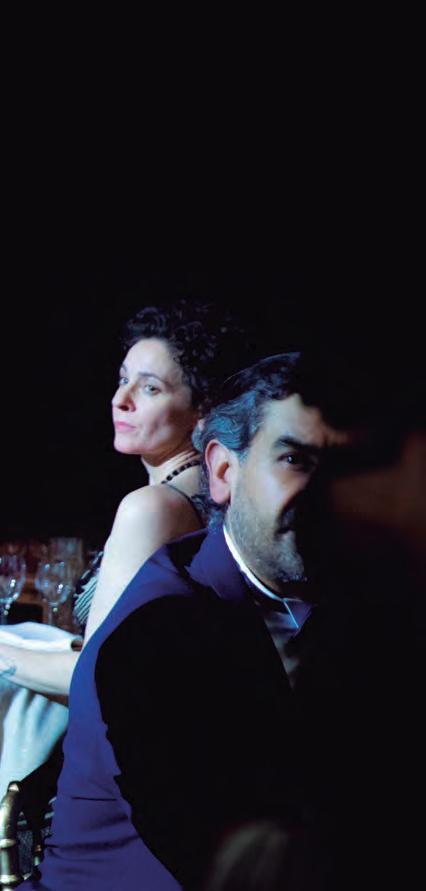
However, the film’s success has been accompanied by continued controversy. Since it was first screened, the film has been the subject of heated criticism,
especially in Mexico and Latin America , where various sectors have accused the film of showing an alarming insensitivity to local problems, pointing out that it trivializes drug trafficking and forced disappearances, in addition to spreading cultural stereotypes considered incorrect.
Audiard has defended himself and stated that, although he spent four years working on the story, he does not intend to know Mexico like the Mexicans. “It is an interpreted reality (…) You cannot ask an opera to be absolutely precise and realistic, because it does not strictly address the brain, it speaks to the heart,” he told Agencia EFE.
The controversy has been getting worse due to some statements by the director of A Prophet and Rust and Bone given to the French media Konbini on August 21, 2024 and that have now regained relevance, where he assured that “Spanish is a language of an emerging country, a language of a modest country, of poor people, of migrants”, comments that have been widely rejected in Mexico and that have fueled the debate on the perception of European cinema regarding to Latin American realities, generating an intense exchange of opinions on social networks and the media.
One of the most conflicting points has been the absence of Mexican talent in the main roles. Except for the actress Adriana Paz, the cast is made up mostly
of performers who do not have Mexican origins, something that was justified by the casting director, Carla Hool, who argued that, after an extensive search, the best actors for the project turned out to be foreigners. These statements also stirred up massive outrage in the Mexican community, perceiving them as a disrespect towards Mexico’s local talent.
Mexican cinematographer Rodrigo Prieto , famous for his collaboration with Martin Scorsese in films such as The Wolf of Wall Street (2013), Silence (2016), The Irishman (2019) or Killers from the Flower Moon (2024), spoke about this subject in an interview given to Deadline on November 24, 2024: “First of all, I don’t like that the film was not filmed in Mexico. Secondly, why not include more Mexicans to participate in the production? Everything is completely false. I’m not talking about the musical aspect, which I think is great. That’s a great idea. But why not hire a Mexican production designer, a costume designer, or at least some consultants? There would never be a sign in the prison that said ‘Prison’, but rather ‘Penitentiary’. Yes, they had dialogue coaches, but I was offended that a story like that was portrayed in a way that seemed so inauthentic. I’m not against non-Mexicans making films in Mexico, but the details are important. Look at Ang Lee. He’s from Taiwan and made Brokeback Mountain. But he does focus on the details.”

However, other influential figures in the Mexican film industry, such as the Oscarwinning director Guillermo del Toro, praised the film in a meeting held on January 9, 2025 in which he coincided with Jacques Audiard, highlighting its artistic value: “The tone of a film works when a film exists in a cinematic reality. And Emilia Pérez achieves this. Its rhythm and camera become musical, even when there are no musical moments. The use of light is very wise. It is beautiful to see a film that is cinema.”
The use of artificial intelligence has also been a matter of debate. It was revealed that the production used Respeecher technology to improve the Spanish pronunciation of actresses such as Selena Gomez and Zoe Saldaña, as well as to harmonize the musical notes of Karla Sofía Gascón. This fact also raised several questions about the authenticity of the interpretations and the integrity of the creative process in a work that seeks to address issues of identity and representation. Although the use of AI in cinema is a topic in constant evolution, the case of Emilia Pérez has been especially controversial due to the relevance it has in the construction of its characters and the development of its artistic style.
The incessant controversy in which the film is involved has had its latest chapter with the statements that the actress Karla Sofía Gascón made on January 21, 2025 for the Brazilian newspaper Folha de Sao Paulo, where she indicated that she had
been the victim of a smear campaign on social networks by the team of the Brazilian film I’m Still Here (2024), directed by Walter Salles, and the environment of its protagonist, Fernanda Torres, with whom the Spanish actress competes for the Oscar: “I think she is a wonderful woman, apart from an incredible actress who deserves all the recognition in this world. What I don’t like is that there is a social media team that works around these people trying to throw shade on the work of others, such as mine, or that of the film.”
Beyond the controversy, Emilia Pérez has become quite an event that has surpassed the cinematic borders thanks to her mix of musical elements, its look at gender identity and its portrait of violence in Mexico.
These statements could conflict with the strict code of the Hollywood Academy, which urges all those involved in the films not to make statements that could undermine the promotion and box office performance of other productions, which would put her nomination at risk
Moreover, several old Gascón tweets have also recently come to light with Islamophobic remarks, mockery of the African-American community and criticism of inclusion in the Oscars. Given the outrage generated, the actress had to issue an official statement on October 31, 2025 through the Netflix platform, in which she offered apologies: “I want to address the comments regarding my previous publications on social networks because they have caused pain. As a member of a marginalized community, I know this suffering all too well and I am deeply sorry for having caused pain. All my life I have fought for a better world. I believe that the light will always triumph over the darkness.”
Beyond the controversy, Emilia Pérez has become quite an event that has surpassed the cinematic borders thanks to her mix of musical elements, its look at gender identity and its portrait of violence in Mexico, which have generated diametrically opposed opinions.
For some, it is a masterpiece that reinterprets realities from an artistic prism, while for others it is a failed representation, disconnected from the context it tries to portray.
The truth is that, beyond the opinions of its detractors and defenders, the film has managed to spark a global conversation about the responsibility of filmmakers when addressing sensitive topics and has become the international film of the year.



IN THE ARTICLES REPORTING THE DEATH OF DAVID LYNCH, THE JOURNALIST INSISTED THAT HE HAD TAKEN THE MEANING OF HIS FILMS TO THE GRAVE. WHAT MANY DO NOT SEEM TO UNDERSTAND IS THAT THE MEANING IN HIS FILMS IS NOT IN ITS PLOT INTERPRETATION, BUT IN THE CASCADE OF EMOTIONS THAT ITS IMAGES (AND SOUNDS) AROUSE.


In the pre-Lynchian film that most points towards what Lynch’s universe would later be, Last Year at Marienbad (1961), director Alain Resnais and his screenwriter, Alain Robbe-Grillet, sought to recreate the chaotic mechanisms of human thought. That is why the camera of his cinematographer, Sacha Vierney, moved sinuously through the corridors of the

Munich locations where the feature film was shot: in a certain way, it was a way of recreating the (unsuccessful) effort of trying to reach a lost memory.
Under the influence of the nouveau roman in which Robbe-Grillet’s literary work belonged, narration gets fragmented, makes temporal jumps, falls into reiterations with small changes, to avoid a simple reading. And to leave, therefore, the interpretation of what has happened on screen in the hands of the viewer, without offering any type of guidance.
In the same way, David Lynch always avoided offering any explanation about the meaning of his filmography . As a multidisciplinary creator who actually ended up in the film industry almost by chance, he quickly learned the lesson of Resnais and Robbe-Grillet that by leaving your work open to interpretation, you allow it to live forever. If we understand that creation is not complete when the artist finishes it, but when the audiences observes and reads it from their particular perspective (often influenced by their generational sociocultural heritage), not defining its meaning implies that it will constantly produce new approaches and fresh, even revolutionary, insights. In other words, the work remains alive, relevant. And most importantly: it is still challenging.

Of course, unlike Last Year at Marienbad, where there are no characters, but rather abstractions that allude (in theory) to past feelings, in Lynch the warmth of humanity always prevails. It doesn’t matter how
stylized the narrative is, nor that it becomes as opaque to the viewer as in Inland Empire (2006). The feelings, conflicts, contradictions of its characters always survive under the plot enigmas. The essence of his cinema resides in making it easy for his audience to connect on a primary level with recognizable emotions, so that they can more easily allow themselves to be carried away by the most unattainable part of his narrative.
How could the most ‘conventional’ films of his career not work (and how could they not be appreciated by the viewers most reluctant to value his most radical cinema) such as The Elephant Man (1980) or A Straight Story (1999), when this very Lynchian humanity comes to the forefront.
Lynch’s work couldn’t really be understood without the pivotal clash between a relatively idyllic childhood and an early youth that exposed him to the violence of the adult world . In other words, he grew up immersed, like most of the American baby boomer generation, in the dream of suburban life and the American Way of Life. So, when he arrived in mid-60s Philadelphia—a depressed, nightmarish city—it was like the bubble of (relative) tranquility in which he had been raised
burst, sparking his interest in the darker side of humanity.
You can’t understand what’s Lynchian, in fact, without this deep love-hate relationship the filmmaker had with the city where he grew up as an artist. His recurring obsession with industrial locations, eroded surfaces, and mechanical, repetitive sounds (the perfect expression of all this might be the fascinating Industrial Symphony No. 1 (1990)) comes from this early shock. Lynch spent his life trying to escape from that experience, and at the same time, he constantly replicated it, almost as if he needed to return to it to (re)connect with his origins as a creator.
His first approach to cinema, there at the Pennsylvania Academy of the Fine Arts, came during his search for a way to bring life and movement to his paintings. This led to Six Men Getting Sick (Six Times) (1967), followed by a series of short films in which free, unfiltered artistic expression collided with storytelling, eventually resulting in a debut feature as brilliant, oppressive, and exhausting as Eraserhead (1977). It is probably Lynch’s most abstract film, closest in spirit to what Resnais and Robbe-Grillet proposed in Last Year at Marienbad


The difference, though, is that where they were cerebral, Lynch has always been intensely emotional. After all, the nightmarish depiction of fatherhood in Jack Nance’s character can be understood as a painful (twisted and distorted) projection of the director’s own experiences in Philadelphia during his marriage to his first wife, Peggy Reavey, following the birth of their daughter Jennifer.
This brings us back to the clash mentioned earlier. Once his Philadelphia experience had been exorcised for the first time, Lynch’s vision of human existence began to take on a much richer, more complex shape. A vision that fully came to life in Blue Velvet (1986), embodied in the brilliant visual metaphor that opens the film: that idyllic suburban garden in which, when the camera dives into the grass, a parallel world emerges, with beetles fighting each other.
In contrast, it’s tempting to consider that it was Lynch’s work that fully matured this Hollywood-style critical vision, one later inherited by directors like Tim Burton, of the hypocrisy hiding behind American suburban life. But that would be a mistake, because for Lynch, there is no
such hypocrisy. Just as there’s no separation between the worlds described in that first sequence of the film: everything is part of the inherent complexity of being human.
This is where the split in Lynchian protagonists begins, reaching its peak in Lost Highway (1997). Although the viewer might naturally interpret the generic codes from a conventional perspective, Frank (Dennis Hopper) is not the antagonist of Jeffrey (Kyle McLachlan). Just as Alice is not an alternative version of Renee (both played by Patricia Arquette). They simply represent the seemingly opposite tendencies of human behavior.
The point Lynch makes through his work is that it is social structures that push us to think there’s a contradiction between the two when, in reality, there isn’t. In Lynch’s universe, those boundaries, those restrictions, have been abolished, so light and darkness coexist in harmony. Perhaps the perfect expression of this is the character of Laura Palmer (Sheryl Lee), especially in the splendid and misunderstood Twin Peaks: Fire Walk with Me (1992).
That’s why, starting with Blue Velvet, Lynch’s work naturally gravitates
towards genre cinema. It’s not just a way of giving his work a slightly more commercial feel. By building his narrative from generic tropes, he can more easily break away from conventional, structured storytelling and let the visceral nature of his artistic expression flow. The genre, in this way, takes that abstraction and shapes it, embracing it and making it consumable.
Hence the connection with Barry Gifford, a writer from a strong noir background, after adapting him in Wild at Heart (1990), as well as in Lost Highway and the two episodes Lynch directed for the series Hotel Room (1993), which never made it past the pilot. But also his work on Twin Peaks with Mark Frost, who was a screenwriter in Hill Street Blues (19811987).
From this perspective, it’s easier to understand the bewilderment with which the mainstream audience received a much freer work (not surprisingly, it was filmed without a written script) like Inland Empire, because it forced viewers, once again, to surrender to pure visceral experience. Much closer, like Eraserhead , to Last Year at Marienbad

CINEMA, AS AN ARTISTIC EXPRESSION, HAS ALWAYS REFLECTED THE AESTHETIC AND INTELLECTUAL CURRENTS OF EACH ERA, INCLUDING THE AVANT-GARDE MOVEMENTS THAT REVOLUTIONIZED PAINTING, LITERATURE, AND PHILOSOPHY. ONE OF THE MOST SUBVERSIVE AND INFLUENTIAL WAS SURREALISM, A MOVEMENT BORN FROM THE DESIRE TO FREE THE MIND FROM THE SHACKLES OF REASON AND EMBRACE DREAMLIKE NONSENSE, EMERGING AFTER A PERIOD OF EXTREME COLLECTIVE SUFFERING: WORLD WAR I.
The impact of the surrealist movement on the seventh art has been immense, giving rise to works that defy conventional logic and transport the viewer to oneiric universes where time and space dissolve, and images, much like dreams, dance and intertwine while breaking free from the corset of reality.
To begin, it is important to explain that Surrealism was officially established in France in 1924 with the publication of ‘The Surrealist Manifesto’ by André Breton. Its main premise was the exploration of dreams, the subconscious, and the irrational as a path to achieving a higher truth. Influenced by Dadaism and Freud’s psychoanalytic theory, this movement
sought to break established norms and explore the darkest and deepest recesses of the human psyche.
Cinema, with its ability to manipulate time, space, and narrative, became an ideal medium to channel the concerns of this new avant-garde movement. Through incongruous imagery, unexpected juxtapositions, and a fragmented structure, surrealist filmmakers defied narrative conventions and immersed the audience in unprecedented cinematic experiences.
Perhaps the greatest exponent of Surrealism in contemporary cinema was the protagonist of the previous article, David Lynch, but many others deserve to be highlighted. Below, we review some other directors whose work has been
significantly influenced by the surrealist avant-garde
EARLY EXPONENTS OF SURREALIST CINEMA
The first film with surrealist influences was The Seashell and the Clergyman (1928) by Germaine Dulac, with a screenplay by Antonin Artaud. However, the work that laid the foundation of the genre and became its most emblematic piece was An Andalusian Dog (1929), directed by Luis Buñuel and co-written with Salvador Dalí. With iconic images such as the famous scene of an eye being sliced by a razor, this film is a succession of dreamlike tableaux that explore the most disturbing recesses of the subconscious.

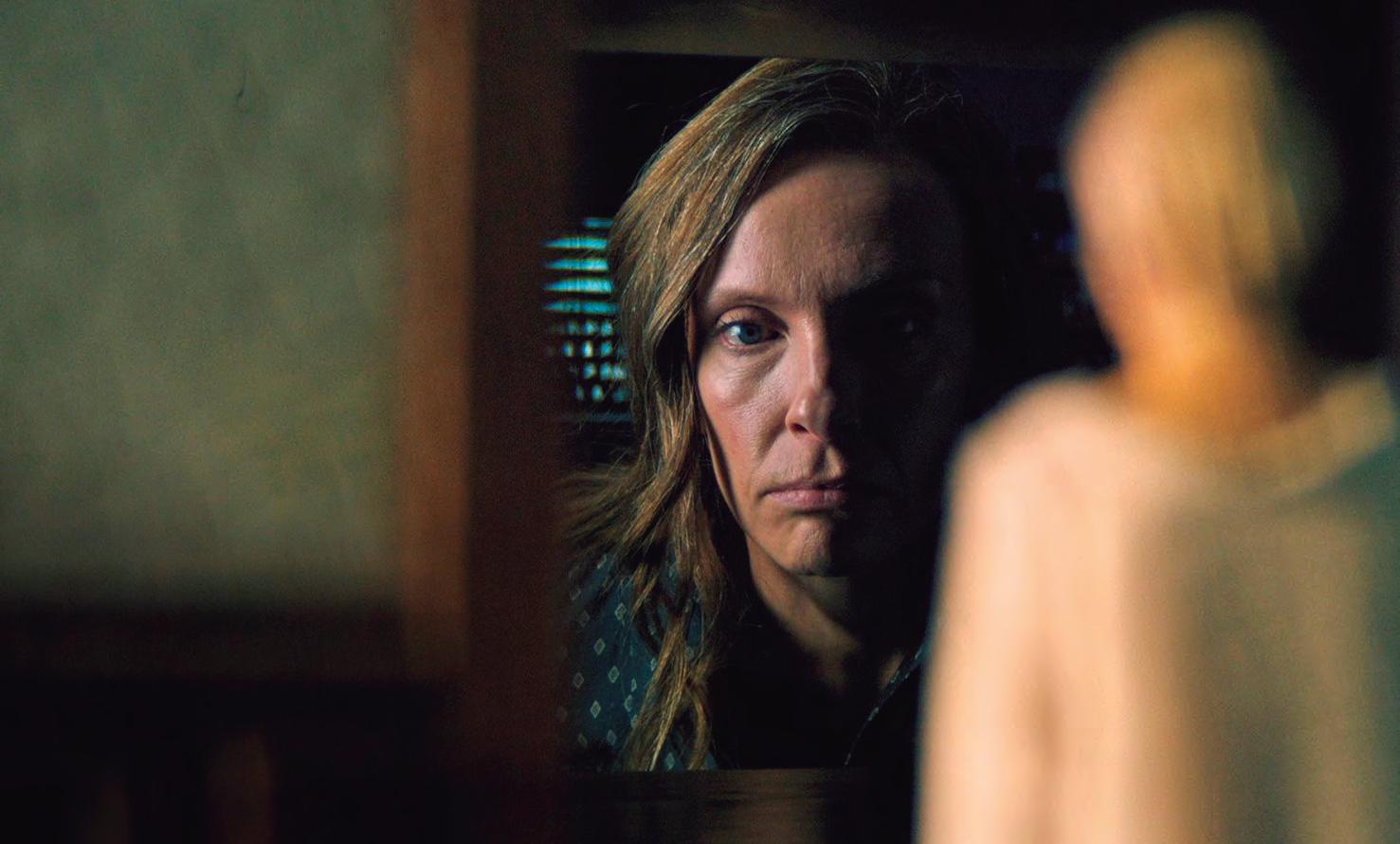
Buñuel continued his career with Age of Gold (1930), where Surrealism took on a more combative nature, filled with criticism towards bourgeois society and religion. Other contemporary artists who ventured into this movement included Jean Cocteau with The Blood of a Poet (1930). Although rejected by the main ‘official’ representatives of the surrealist movement—the author himself attributed these differences more to romantic quarrels than artistic disagreements—Cocteau successfully captured the essence of experimentation and irrationality in his cinema.
From the 1940s onward, figures such as Maya Deren took Surrealism into more experimental realms. Her film Meshes of the Afternoon (1943) is a hypnotic journey where time fragments and repeats, creating a dreamlike atmosphere that explores identity and the perception of reality. Her innovation in editing, looped narrative, and use of symbolism have influenced generations of experimental filmmakers.
Kenneth Anger, with Fireworks (1947), infused Surrealism with an erotic and transgressive charge, exploring queer identity through symbolic imagery and fragmented storytelling. His work,
considered one of the first films with homosexual themes, served as inspiration for a vast number of underground and activist cinema productions in later years.
Surrealism has also left a significant mark on animated cinema. The creative freedom of this medium has allowed filmmakers to explore dreamlike worlds and unconventional narratives. A notable example is Fantastic Planet (1973), a French animated film directed
by René Laloux. The story unfolds on a planet where humans are treated as pets by a race of giant blue beings called the Draags. The film’s surreal aesthetic and allegorical narrative make it an iconic piece of the genre.
Another key figure in this field is Czech animator Jan Švankmajer, renowned for his unique way of portraying the oneiric and the grotesque through stopmotion techniques. His film Alice (1988) transforms the classic children’s tale into a disturbing experience, far removed from the sweetness of Disney’s version.
Similarly, Paprika (2006) by Satoshi Kon explores the boundary between dreams and reality with a fascinating visual fluidity, using animation to depict the fragility of memory and identity. Kon, like several of his contemporaries, explored animation’s potential to materialize dreamlike visions in ways that live-action cinema often cannot match. Themes he further emphasized in his masterpiece Perfect Blue (1997), where dream and reality intertwine for both the protagonist and the viewer, creating a distressing and suffocating narrative in which nothing in young Mina’s path to fame is as it seems.
Also worth mentioning in this area is the recent and highly remarkable The Shivering Truth (2018), a stopmotion animated series created by Vernon Chatman that explores the absurd, unsettling, and oneiric through a fragmented and chaotic narrative.

A surreal adventure where episodes function as a series of interconnected vignettes that defy conventional logic, evoking the sensation of a fever dream or an ever-evolving nightmare.
Phil Tippett’s Mad God (2021) revisits surrealist aesthetics and themes with a haunting fusion of stop-motion and nightmarish visual effects. Mad God is a hypnotic journey through a chaotic and disturbing world inhabited by grotesque creatures and desolate landscapes, evoking the apocalyptic vision of a delirious mind. Tippett, a master of visual effects, spent decades completing this project, crafting a work that fuses artisanal technique with profound symbolic and philosophical content. His exploration of decay, fear, and bodily metamorphosis directly links him to the legacy of surrealist cinema.

Although surrealist cinema peaked in the early 20th century, its influence persists today. Contemporary filmmakers, each with their own distinctive style, continue to explore surrealist techniques and themes to challenge narrative and aesthetic conventions.
For example, David Cronenberg has explored Surrealism through body horror in films such as Videodrome (1983) and The Fly (1986), where the human body
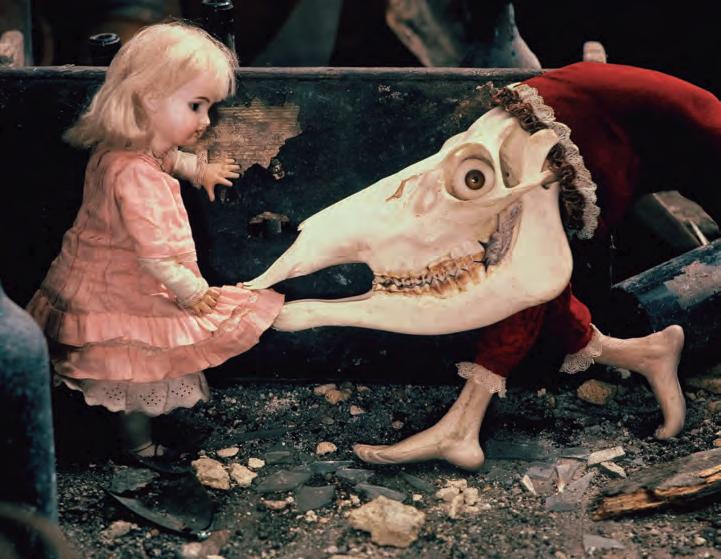
transforms grotesquely and symbolically, reflecting on identity, alienation, and the monstrosity of the self.
Filmmakers like Yorgos Lanthimos, with Doogtooth (2009), The Lobster (2015) and The Killing of a Sacred Deer (2017), have taken Surrealism to a new level, using absurdity and irrationality as tools to analyze the human condition. The Greek director’s work distorts established interpersonal relationships, such as family or romantic partnerships, to the point of making them inherently surreal.
Charlie Kaufman is another notable figure in 21st-century cinema. His films

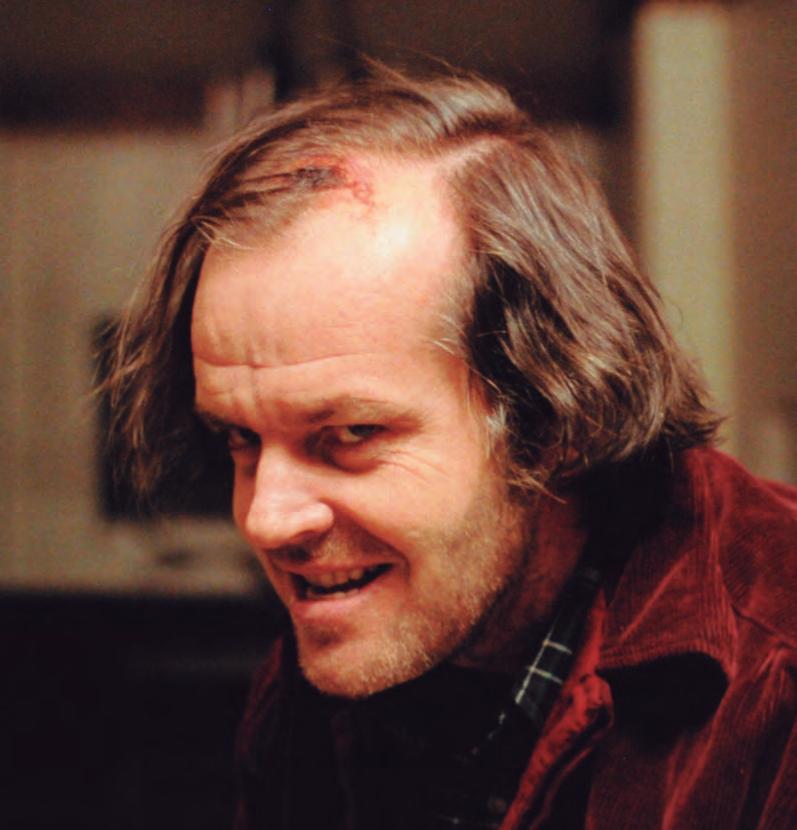
constantly challenge conventional narrative structures and explore the limits of identity, memory, and reality through absurd and metaphysical premises. His scripts, such as Being John Malkovich (1999), Adaptation (2002), and Synecdoche, New York (2008), construct worlds where dream logic replaces traditional logic, creating scenarios where the irrational and the symbolic hold as much weight as the tangible.
Modern Latin American cinema has embraced some of these influences in films like The Wolf House (2018) by Cristóbal León and Joaquín Cociña, a Chilean animated film that plays with the distortion of reality and dreamlike storytelling to create a terrifying yet irresistibly enigmatic world.
The films of Ari Aster, such as Midsommar (2019), and Robert Eggers, with The Lighthouse (2019), show a clear influence of Surrealism by immersing viewers in cinematic experiences that explore the irrational, the symbolic, and the disturbing. Their characters often follow a path leading them into madness, guided by images that embed themselves in their subconscious.
Ultimately, surrealist cinema invites viewers to question the boundary between reality and fantasy—a question as elusive as attempting to recount a dream in a linear way upon waking.





The European Film Location Network (EUFCN) holds every year the Location Awards, its annual prizes for European filming locations. In this article you can get to know the five finalists. The winners will be revealed during the Berlin Film Festival. The ceremony will be held on Monday, February 17th (6 pm) at the Landesvertretung Sachsen-Anhalt.
FRØYA (Norway)
Midgard Film Commission Norway
TV Series: Billionaire Island
MDINA (Malta)
Malta Film Commission
Feature Film: Napoleon
Frøya Island in Trøndelag, Norway, shines in Netflix’s comedy-drama Billionaire Island, where salmon farm rivalry runs deeper than the Norwegian Sea. Frøya’s authenticity as a salmon-farming island, with its raw and rugged coastline, windswept cliffs, and serene bays, is more than just a beautiful backdrop. Series creator Anne Bjørnstad explains, “The combination of the dramatic, archNorwegian landscape and new Malibu-style villas with huge panorama windows makes Frøya a truly unique place, and the perfect backdrop for an intense family feud about wealth.”
Mdina, the Silent City, is a fortified medieval town in Malta whose honey-colored limestone walls, built by the Arabs in the 9th century, enclose a labyrinth of narrow streets and grand palaces, which recently stood in for Paris in Ridley Scott’s Napoleon. Its ready-to-shoot quality has made Mdina a versatile choice for many productions, including Roman Polanski’s Pirates, Kevin Reynolds’ The Count of Monte Cristo, Agora, Gladiator II and Game of Thrones, that were shot within its fortified walls enhances the experience of exploring its palazzos and medieval streets.
Vienna Film Commission
TV Series: The Regime
STAATSOPER STUTTGART (Germany)
Film Commission Region
Stuttgart
Feature Film: Cranko
Canary Islands Film
Feature Film: La hojarasca
Schönbrunn Palace, the Baroque summer residence of the Habsburgs from the early 18th century serves for the very first time ever as filming location. It is the residence of reigning dictator Elena Vernham (Kate Winslet) in HBO’s limited series The Regime, directed by Stephen Frears and Jessica Hobbs. An architectural masterpiece, Schönbrunn Palace impresses with its extraordinary and pompous exteriors as well as interiors, which make the perfect on-screen residence for a selfish, neurotic dictator.
The Staatsoper Stuttgart, a classical building by the Eckensee, has been a hub for operatic art since 1912. Designed by Max Littmann, it blends tradition and modernity, seating over 1400 and boasting excellent acoustics. Recently, it served as the primary filming location for Cranko, a film by Joachim A. Lang about choreographer John Cranko, who revolutionized the Stuttgart Ballet in the 1960s. Lang aimed to spotlight Stuttgart’s greatness, and the project has strengthened local identity while emphasizing the film industry’s importance to the region.
La Palma, known as La Isla Bonita, is the greenest of the Canary archipelago. La hojarasca (The Undergrowth), by Macu Machín, which blurs the thin line between documentary and fiction, is shot entirely on the island. The film was profoundly affected by the eruption of the Tajogaite Volcano in 2021. With lush forests and steep coasts that hide black sand beaches, La Palma – declared a Biosphere Reserve by UNESCO – surprises visitors with its ecological treasures and exceptional nature. The film integrates this natural and historical event into a cinematic narrative, portraying the reality of the people who experienced the eruption of the Tajogaite volcano in La Palma.

THE CITY OF MADRID REMAINS STRONG IN 2024, ACCORDING TO DATA FROM MADRID FILM OFFICE, THE SCREEN OFFICE OF THE MADRID CITY COUNCIL. LAST YEAR, THIS OFFICE ESTIMATES THAT THE CITY HOSTED THE FILMING OF 41 FILMS, 53 TV SERIES (48 FICTION SERIES AND 5 DOCUSERIES), AND MORE THAN 430 MEDIUM/LARGE-SCALE COMMERCIALS.
In 2024, Madrid City Council processed 11,419 filming requests, a number slightly higher than the 11,133 requests processed in 2023. In total, over 1,020 projects filmed with public space occupation permits in the city, representing a 5% to 10% increase compared to 2023. This number also includes smaller projects that filmed in the city with permits that did not require exclusive use of public space, which represent about 65% of all requests processed.
Throughout their preproduction, production, and promotion phases, many
of these projects were supported by Madrid Film Office, which assisted over 555 different projects in 2024, a figure comparable to the previous year.
Specifically, Madrid Film Office provided more than 3,853 specific assistances throughout the year in areas such as location scouting, guidance and support with filming permits, coordination and mediation between various public and private organizations and companies, among other activities. This represents an increase of almost 18% compared to 2023, expanding the scope of the support offered by the municipal office.
Of the projects supported in 2024, 62 were international and 493 were national, with notable projects including 52 TV series, 64 fiction feature films, 87 commercials, 72 documentaries, 64 TV programs, and 38 music videos.
The foundation of these figures lies in a solid industrial base. Madrid is home to around 29% of the total active screen companies (2,881 companies) in Spain, according to the latest data available from the Spanish Statistical Office (2023). This accounts for 73.4% of the national revenue (€8.591 billion) and 44.6% of the workforce

(nearly 25,500 people) in the country (2022 data).
“Madrid is home to around 29% of the total active screen companies (2,881 companies) in Spain. This accounts for 73.4% of the national revenue (€8.591 billion) and 44.6% of the workforce (nearly 25,500 people) in the country”
Among the 41 films, the same number as in 2023, there are titles as diverse as The Room Next Door by Pedro Almodóvar, Mikaela by Daniel Calparsoro, Ask Me What You Want by Lucía Alemany, Hotel Bitcoin by Manuel Sanabria and Carlos ‘Pocho’ Villaverde, La deuda by Daniel Guzmán, Todos los lados de la cama by Samantha López Speranza, Father
There Is Only One 5 by Santiago Segura, La sospecha de Sofía by Imanol Uribe, Las delicias del jardín by Fernando Colomo, Un lío de millones by Susan Béjar, Todo lo que no sé by Ana Lambarri, Apuntes para una ficción consentida by Ana Serret Ituarte, Un funeral de locos by Manolo Gómez Pereira, and Mr. Nadie by Miguel Ángel Calvo Buttini, among others.
This year, the streets of the city have served as the setting for the American thriller The Beast by Renny Harlin, starring Samuel L. Jackson.
Madrid continues to be a key hub for series production, with 48 fiction series and 5 docuseries, according to data from Madrid Film Office. Among the international fiction series, Madrid hosted the filming of the third season of the American show The Walking Dead: Daryl Dixon (AMC), which transformed the city into an apocalyptic London; the British series Nine Bodies in a Mexican Morgue (BBC and MGM+); and the Mexican series Isla Brava (ViX). Earlier in the year, the first season of Shared Custody (Disney+), the first series by Javier Fesser (Champions), was completed. and the third season of the Spanish-Japanese series The Head (The Mediapro Studio and Hulu Japan). Additionally, Madrid hosted the filming of
the co-productions Dime tu nombre (Prime Video), co-produced with the American company Skybound Entertainment, and La encrucijada (Atresmedia), which involves the Turkish producer Ay Yapim.
The city also served as the backdrop for highly anticipated new series like Celeste (Movistar Plus+), Superestar (Netflix), The New Years (Movistar Plus+), Sanctuary (Atresmedia), La increíble historia de Julia Pastrana (Disney+), When No One Sees Us (Max), and Salvador (Netflix), as well as new seasons of popular shows such as Red Queen: Black Wolf (Prime Video), The Snow Girl: The Soul Game (Netflix), Alpha Males (Netflix), Muertos S.L. (Movistar Plus+), Breathless (Netflix), Memento Mori (Prime Video), La que se avecina (Mediaset and Prime Video), and Valeria (Netflix).
Additionally, the city was the location for over 430 medium/large-scale commercials, including major brands in the automotive, technology, fashion, and food sectors. According to the 6th ‘Study on the Economic Impact of Commercial Film Production’ by the Association of Commercial Film Producers (APCP), conducted by SCOPEN and sponsored by Madrid Film Office, Madrid accounted for 42% of all commercial filming days in Spain in 2023.
